This is part of my ongoing series in which I compare four translations of Final Fantasy VI with the original Japanese script. For project details and my translation notes from Day 1, see here.
Part 6: Esper Terra to Zozo
During this segment, we visit a couple new towns and learn some information about main characters’ backgrounds. I had a lot of fun with this stream and learned a lot at the same time, thanks to the chat. We also lucked out and got to see one of Shadow’s dreams before he ran away.
Poe went on vacation for about two weeks after this stream, so there was a big break afterward. My original goal was to stream the game every day so we could finish before Poe left, and each day’s notes would be just a rough bullet list of topics we discussed. I wound up doing these more meaningful write-ups instead, so that plan went out the window. But it’s worth it, I think!
Video Archive
Notes
I’ve listed some of the translation highlights from this section of the game below, but I cover many more things during the actual stream. So check out the video if you want to see some more translation discussion that I’ve left off of here.
Surprising Throwback
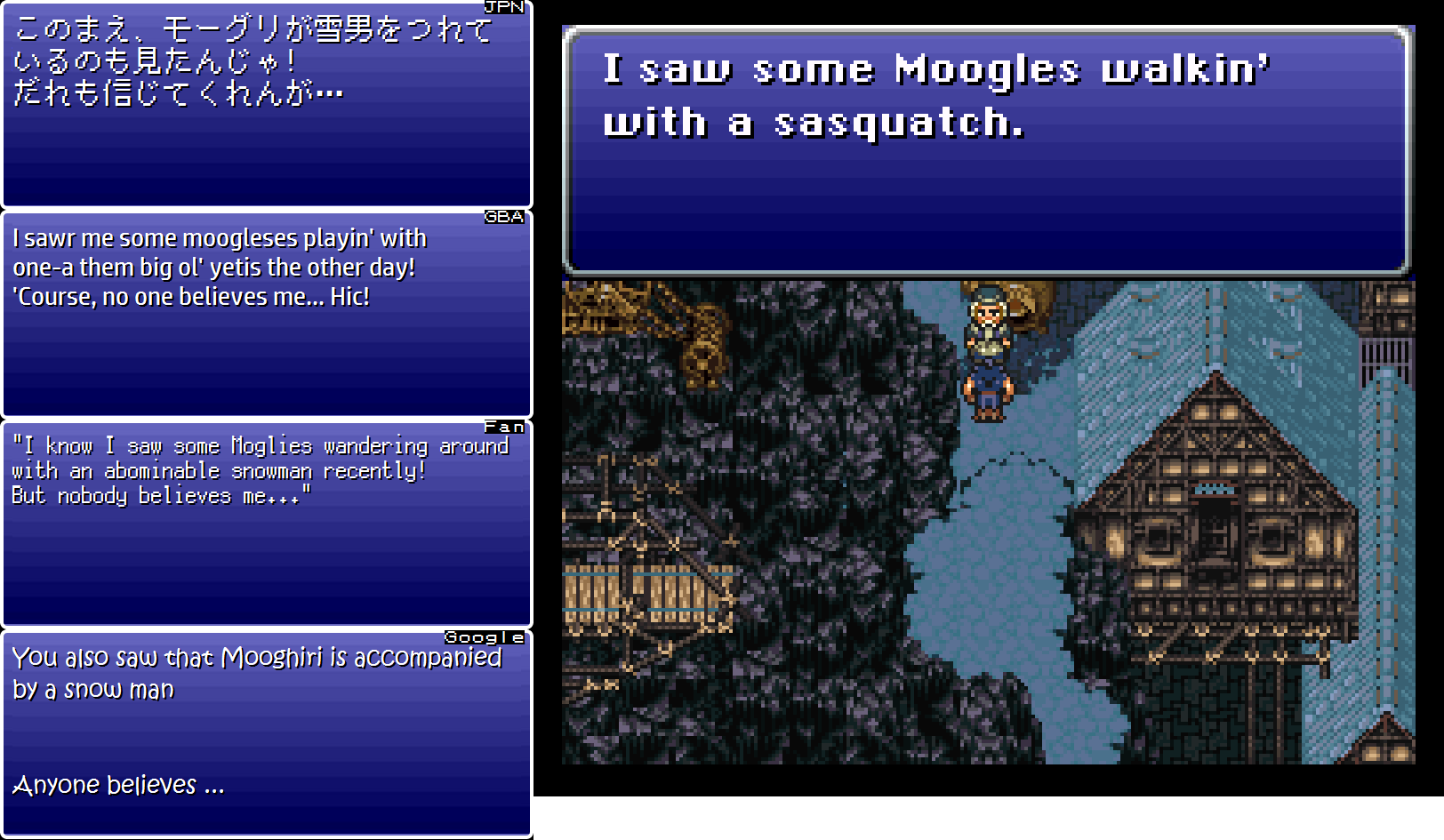
This old man in Narshe talks like a drunk person in the GBA translation, but there’s nothing in the original Japanese script that suggests this man is drunk at all.
At first, I assumed it was a random thing the GBA translator added in for fun, but a commenter noted that there’s actually more to it: the GBA translation of this line apparently references a pre-release version of the Super NES translation!
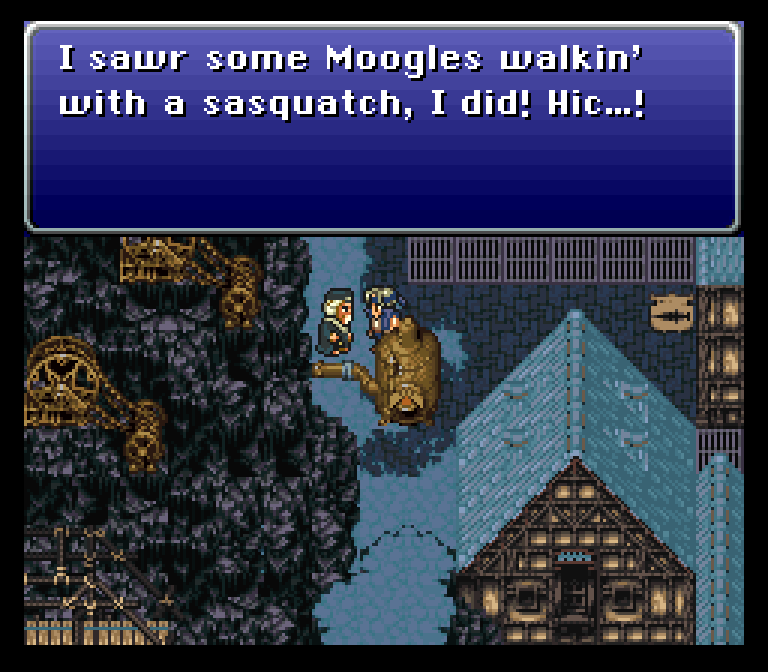 | 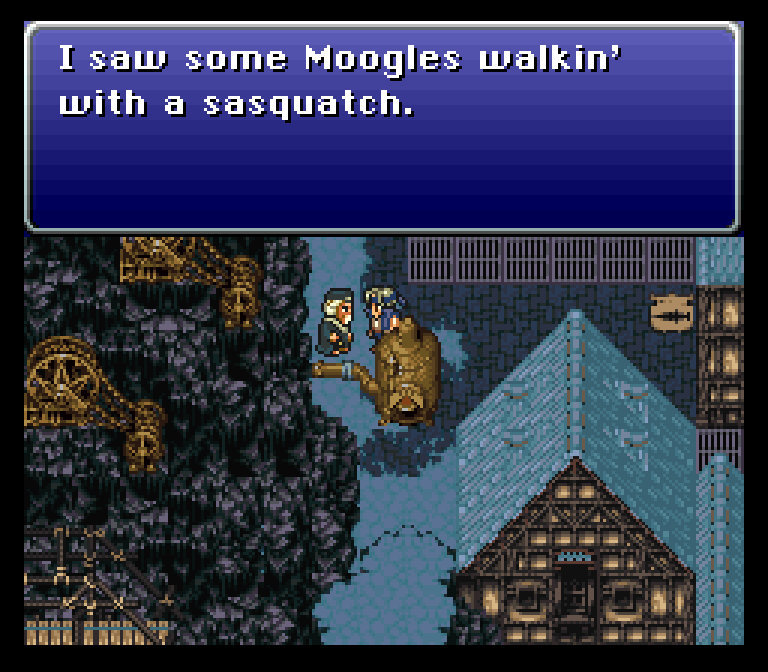 |
| Beta version of Super NES script | Final version of Super NES script |
So it looks like the Super NES translator was the one who added drunkenness to this guy’s line, and just before the game was released it got removed. But the fact that we’re seeing the drunkenness added back into the GBA version makes me think that the GBA translator had access to and/or was using the pre-release version of the Super NES script as a reference. Either that, or the GBA translator learned of the old drunk line via the Internet and decided to add it back in for the heck of it, even though almost nobody ever knew about it or would ever recognize it.
Square’s Swears
When it first came out, Final Fantasy VII’s English release took fans by surprise – it was full of swearing that was never really seen before in previous translations. Sometimes the swears were left in, but other times they were replaced with crazy random characters. Here are some examples:
I had completely forgotten until now that Final Fantasy VI had an instance of this in its translation too, though. A generic NPC in Narshe uses the “random character” swearing technique at this point in the game:
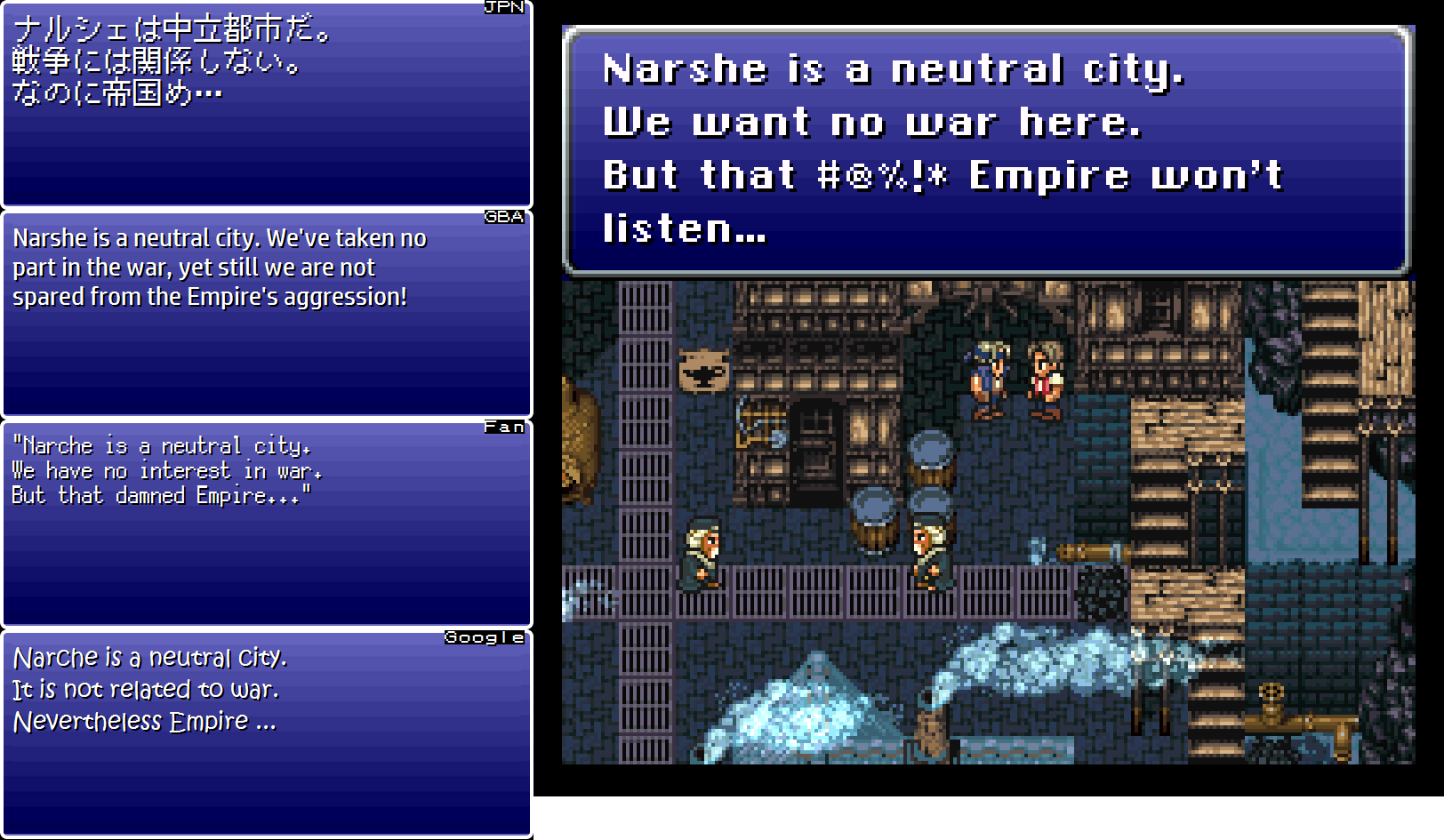
I never thought about it until now, but the Final Fantasy series actually handles swearing in a bunch of different ways. In addition to the examples above, here are two different approaches used in the PlayStation translation of Final Fantasy IV:
Out of these three different censor styles, I personally feel the “random character” one comes across the best. But if you know of any other interesting swear word usage in Final Fantasy games, let me know!
Credit the Translator
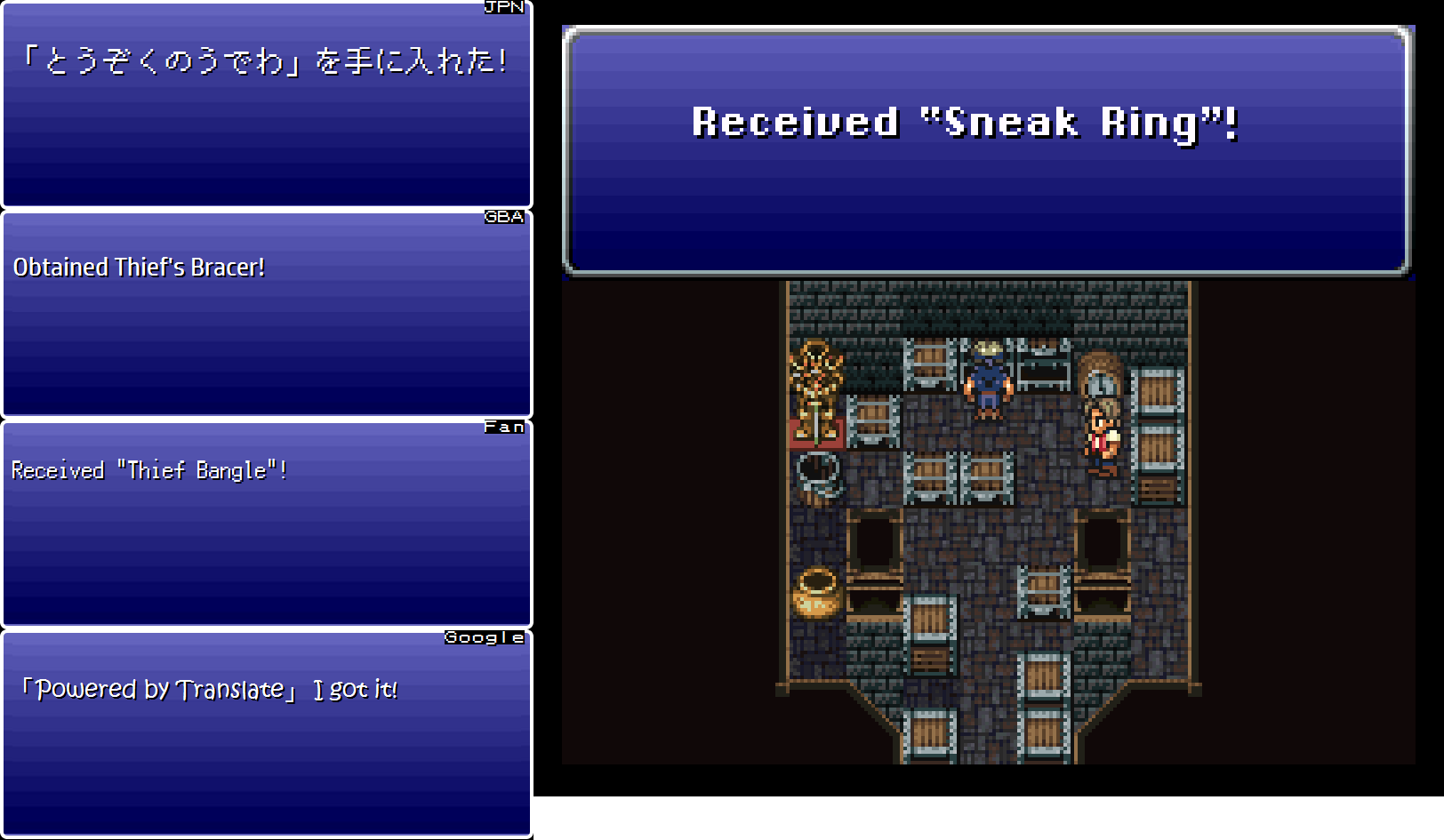
While working on my Google Translation of Final Fantasy IV project a year or two ago, I noticed that Google Translate sometimes translated things as “Powered by Translate”. I still have no idea why it does this – my only guess is that it’s maybe some sort of watermark, similar to all the light watermarks Google puts on its Street View images.
Anyway, the same “Powered by Translate” appears a few times in the Google Translate version of the Final Fantasy VI script, as we can see in the image above.
Flaming Cats
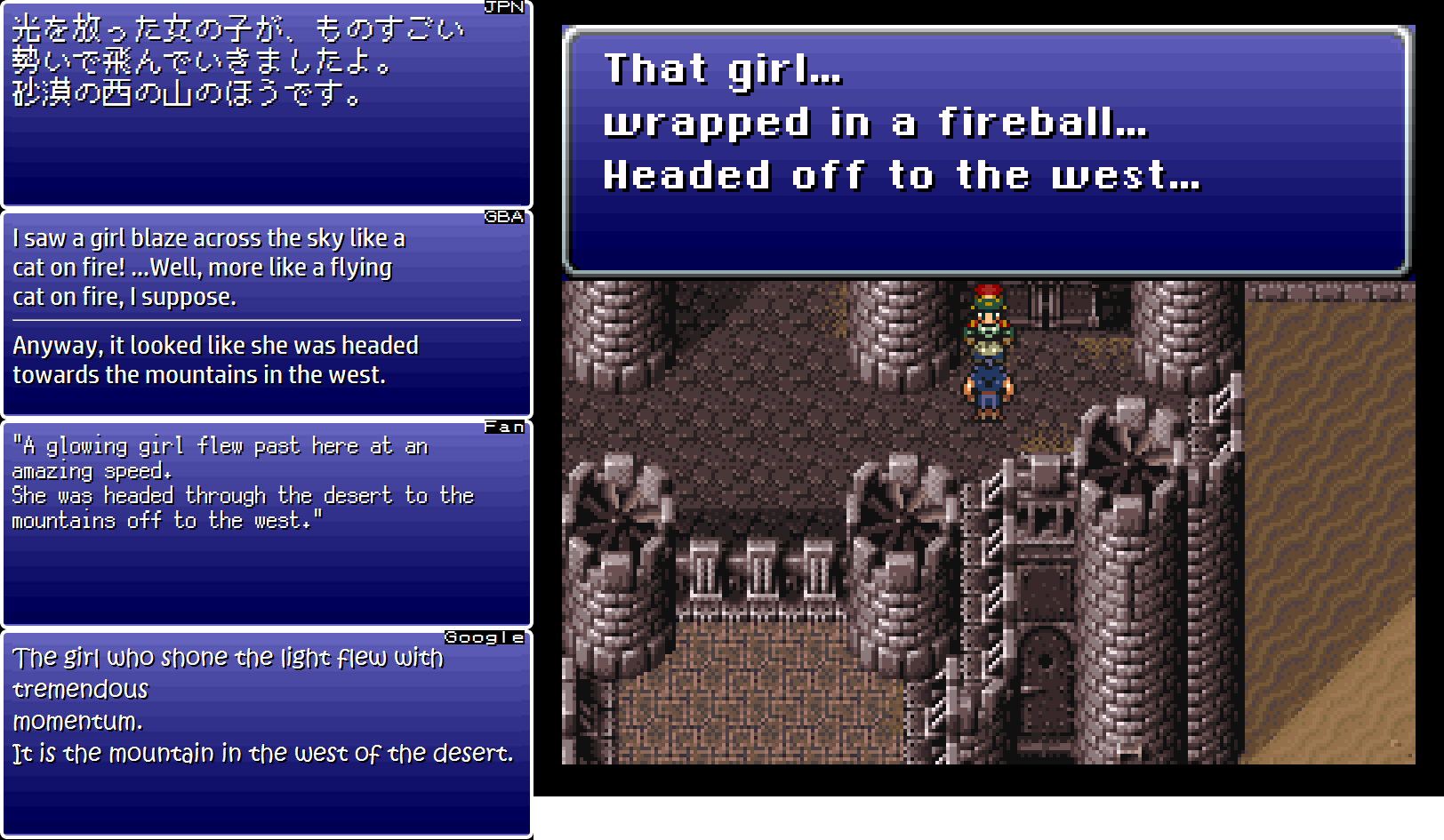
In Japanese, this NPC describes Terra as a “girl giving off light”. The Super NES translation changes it to “wrapped in a fireball”. The GBA translation changes things further and adds a joke about a “cat on fire” out of nowhere. Am I missing a secretly added reference or something?
UPDATE: A commenter mentioned that this is probably a reference to an old meme-like thing involving something called “Speedy Cat” from the early 2000s:
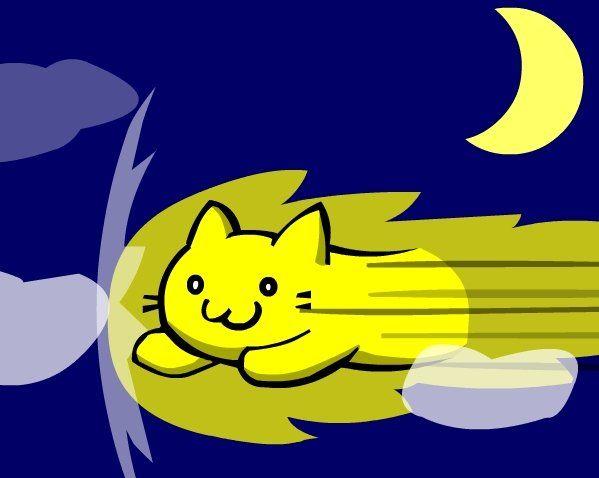
Google Trends lists how popular this meme was back in the day compared to now:
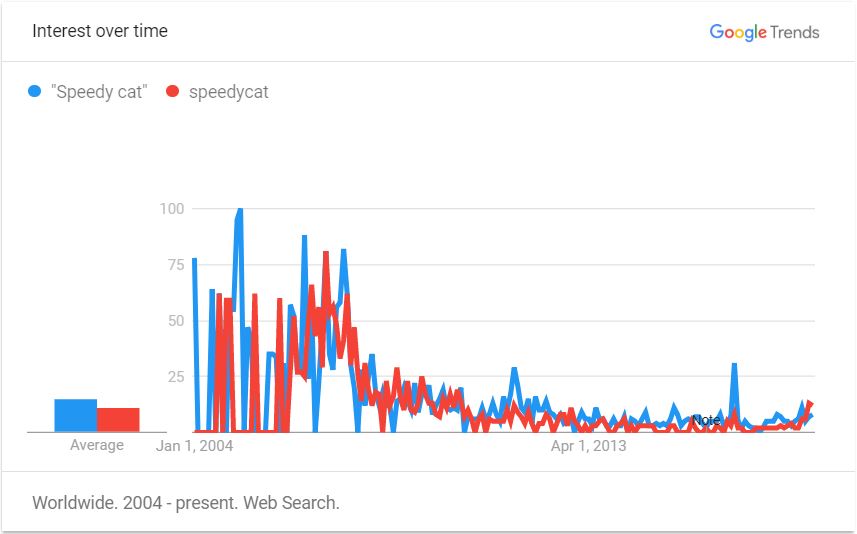
Memes and references get old really fast – in fact, Final Fantasy VI for the GBA was released in English in 2007, as the meme was already well on the decline. Most players probably don’t care about things like this, but since the GBA script has been – and will probably continue to be – used as the basis for all future English re-releases, it’s weird to think that old references like this will remain a part of the game for decades to come.
Sightseeing
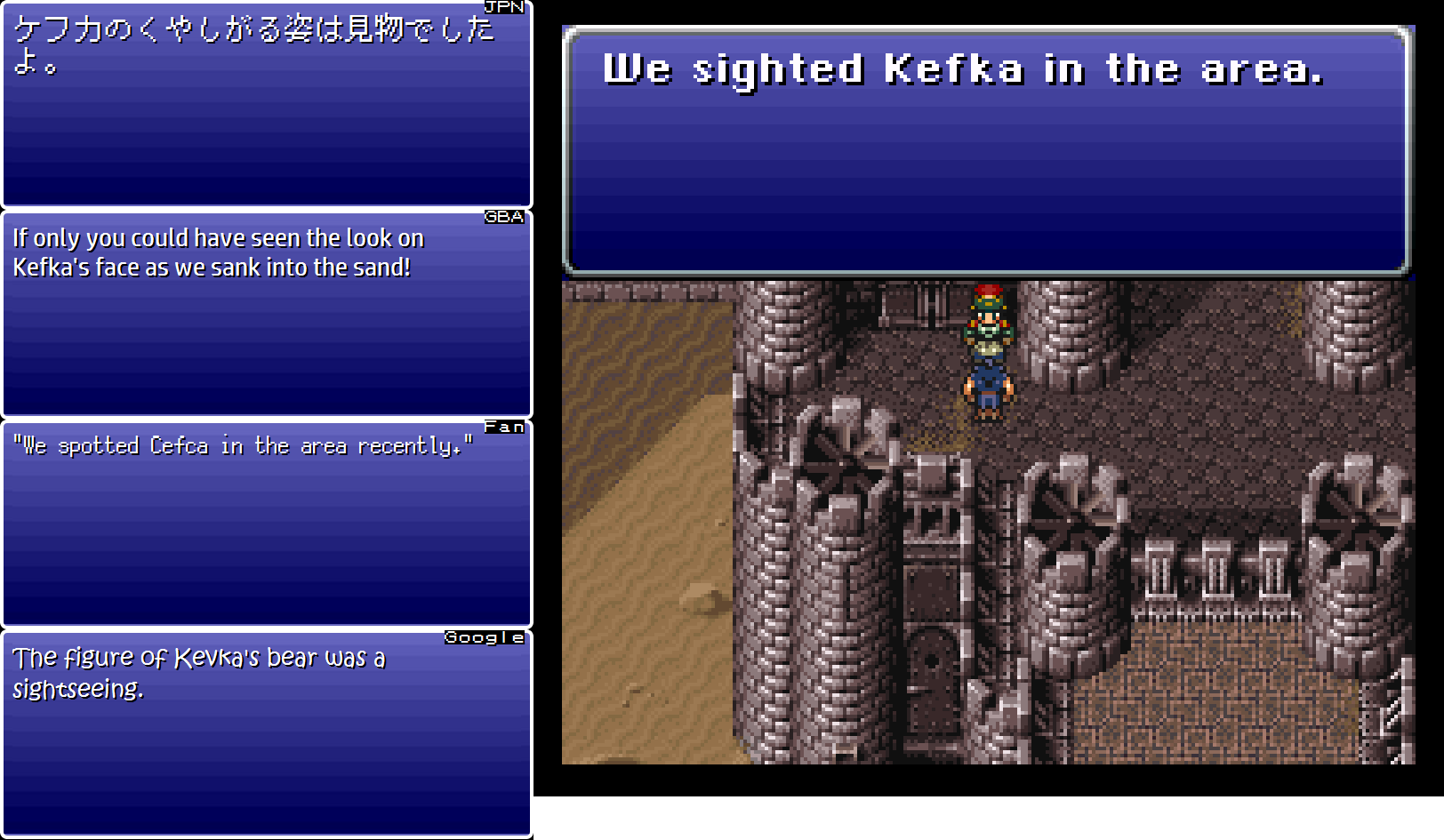
In the Super NES translation, this NPC says, “We sighted Kefka in the area.” But this is completely wrong! In Japanese, he actually says, “Seeing Kefka filled with chagrin/frustration/annoyance was a wonderful sight to behold.”
The GBA translation fixes this obvious mistake, but the fan translation clearly borrows from the faulty Super NES translation.
No One Cares
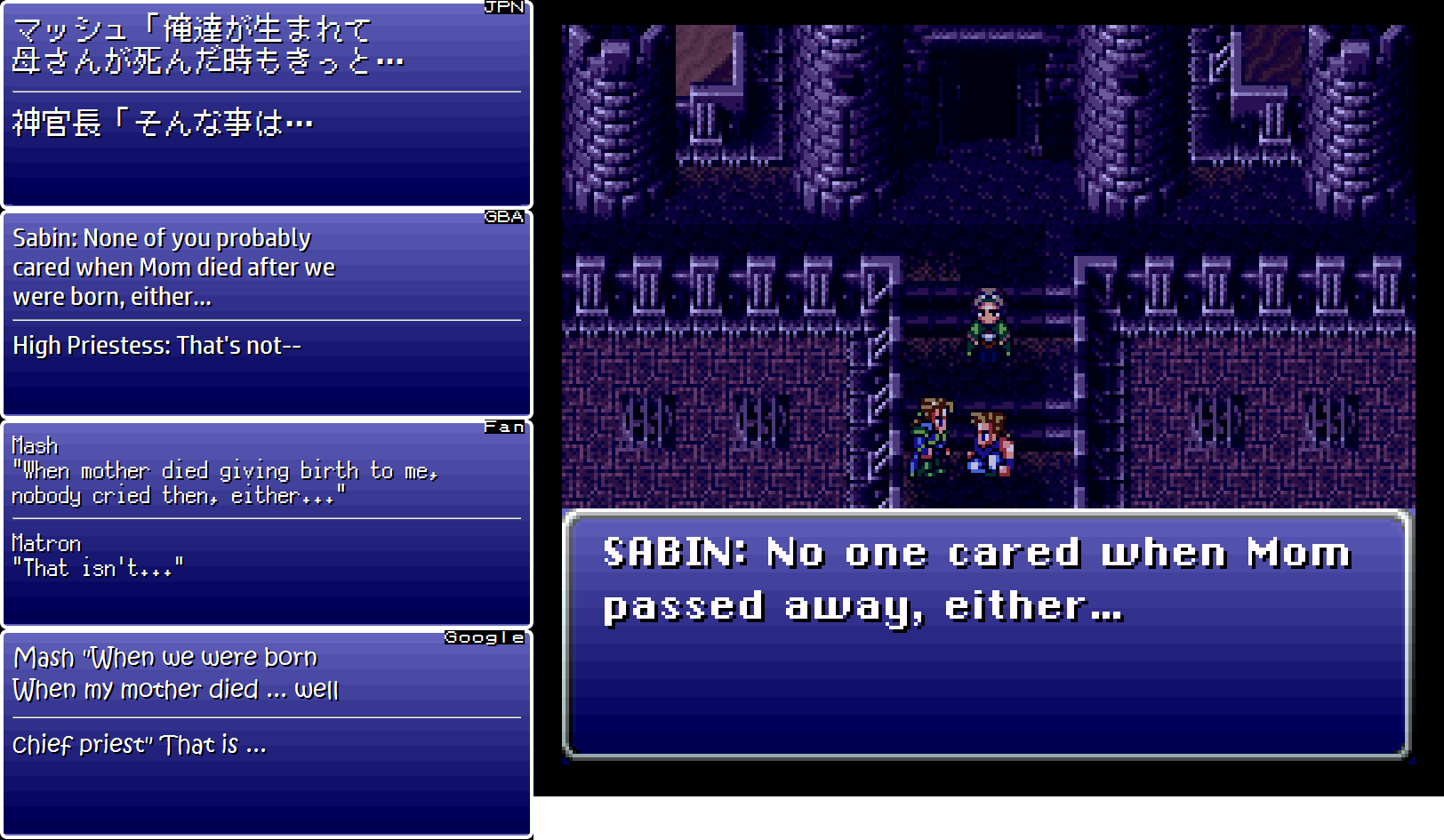
The Super NES translation leaves out an important point here: Sabin and Edgar’s mother died giving birth to them.
The GBA translation adds this detail back in. The fan translation also adds the detail back in, but adds a new mistake: “us” was translated as “me”. Not only is this a Japanese 101-level mistake, the fan translator also apparently forgot that Sabin and Edgar are twins.
Of course, you could argue that maybe the mother only died giving birth to Sabin after giving birth to Edgar without problem shortly before. But it’s a moot point, as the original translation clearly says “we”.
As a professional, mature translator, though, it’s important to control this defensive instinct. If you made a mistake, you made a mistake. Learn from it and get better.
Coin Toss
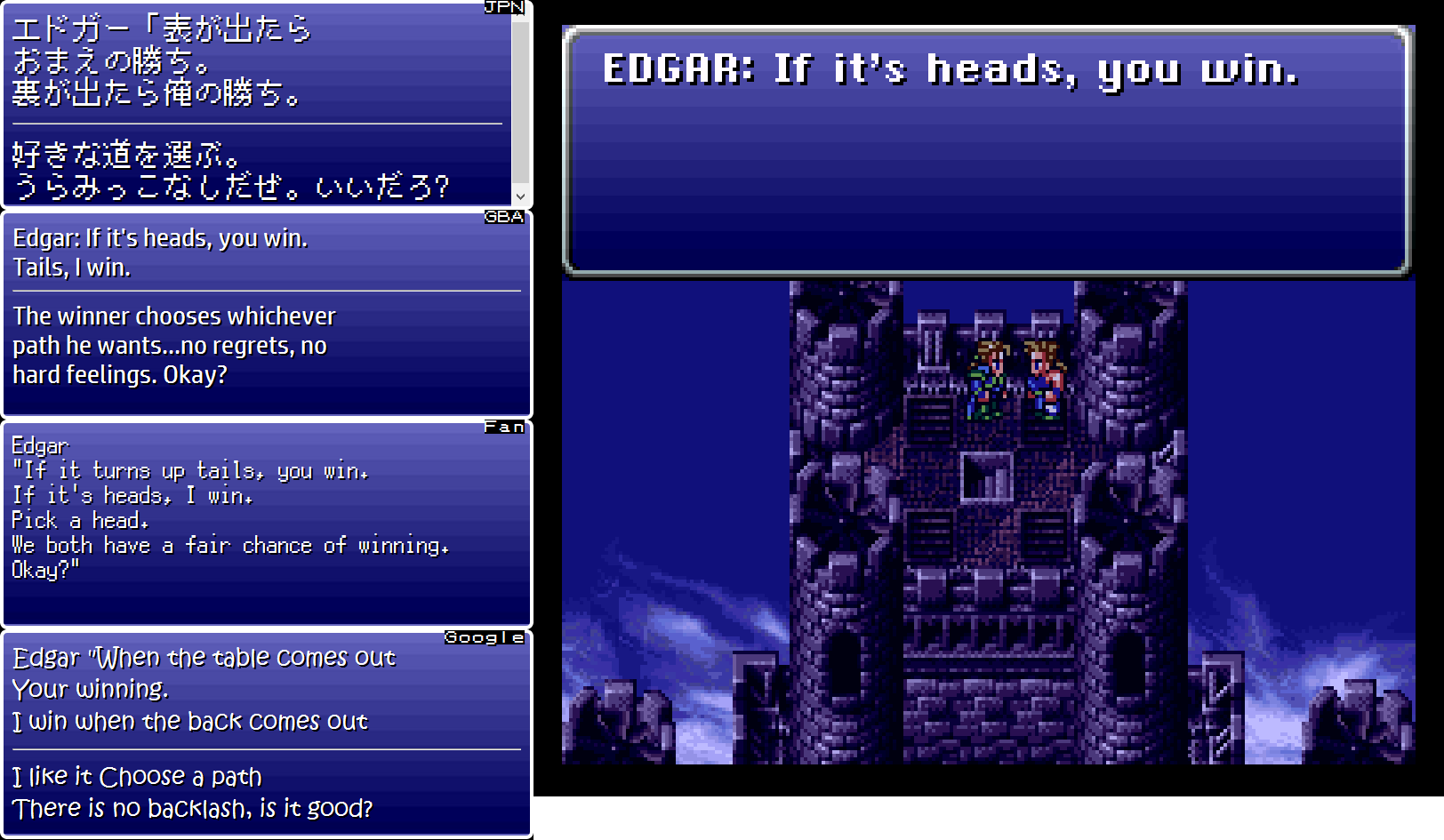
The fan translation gets this whole section wrong during the optional scene between Sabin and Edgar. The biggest mistake of all is that the heads/tails thing got twisted into the exact opposite from what the Japanese script says.
The part about the winner choosing what they want to do in life with no hard feelings is mistranslated in the fan translation too. It’s also the whole point of the scene.
Super Seafood Bros.
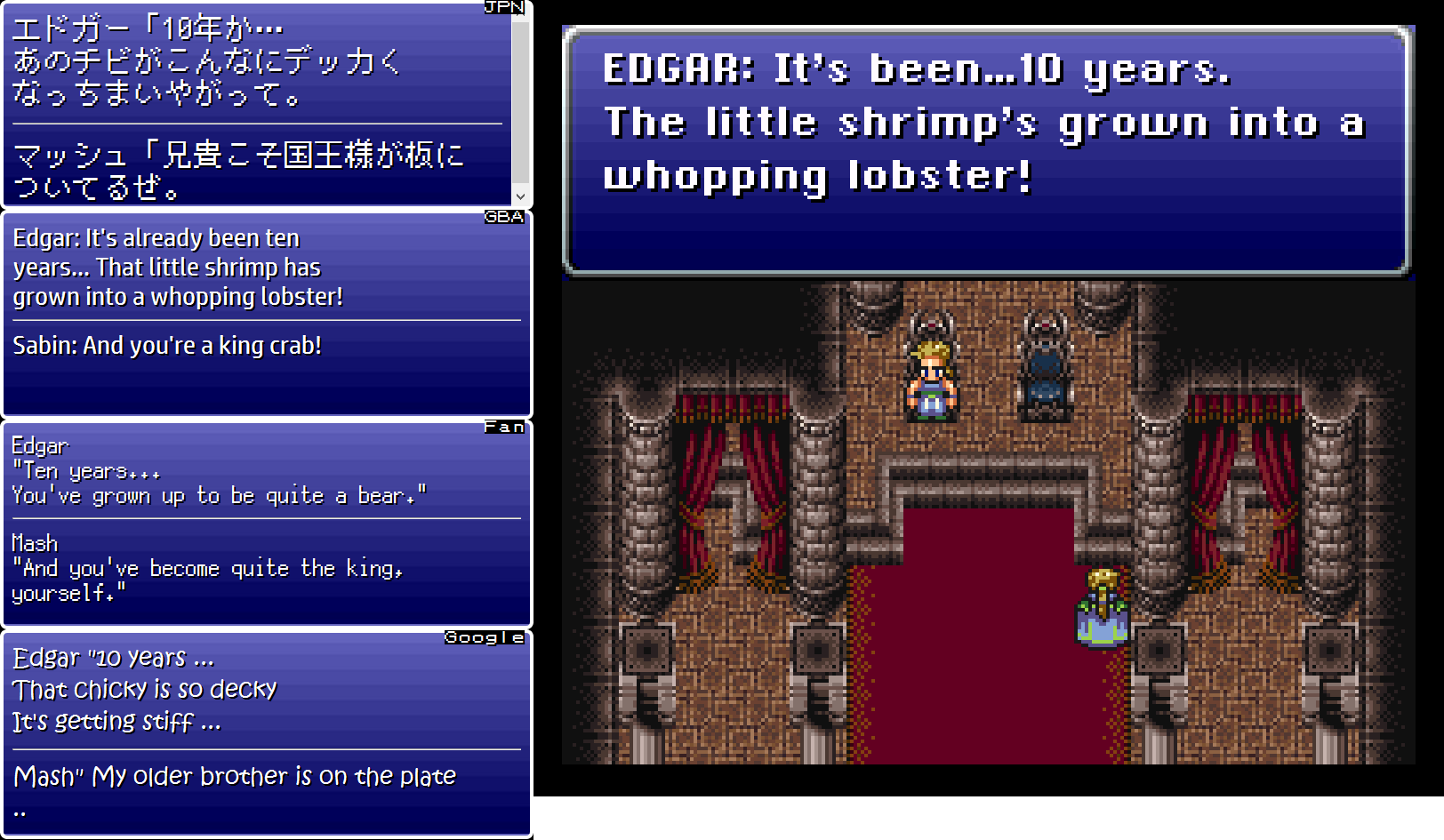
At the end of the scene between Edgar and Sabin, they comment on how much they’ve grown up. The Super NES translation uses some entertaining writing:
Edgar: The little shrimp’s grown into a whopping lobster!
Sabin: And you’re a king crab!
These lines are memorable enough that they stayed unchanged in the GBA translation. But the Japanese text is actually different and not as memorable:
Edgar: That runt’s gone and grown up so much.
Mash: And you’ve really taken to your role as king.
The fan translation doesn’t stick with the Super NES translation here, as it’s clear there’s no mention of seafood in the original text. Instead, the fan script adds a reference to bears, which is a clever callback to the scene when Terra first met Sabin.
The machine translation is just all around crazy, but that’s what makes it so lovable.
Who’s Angry
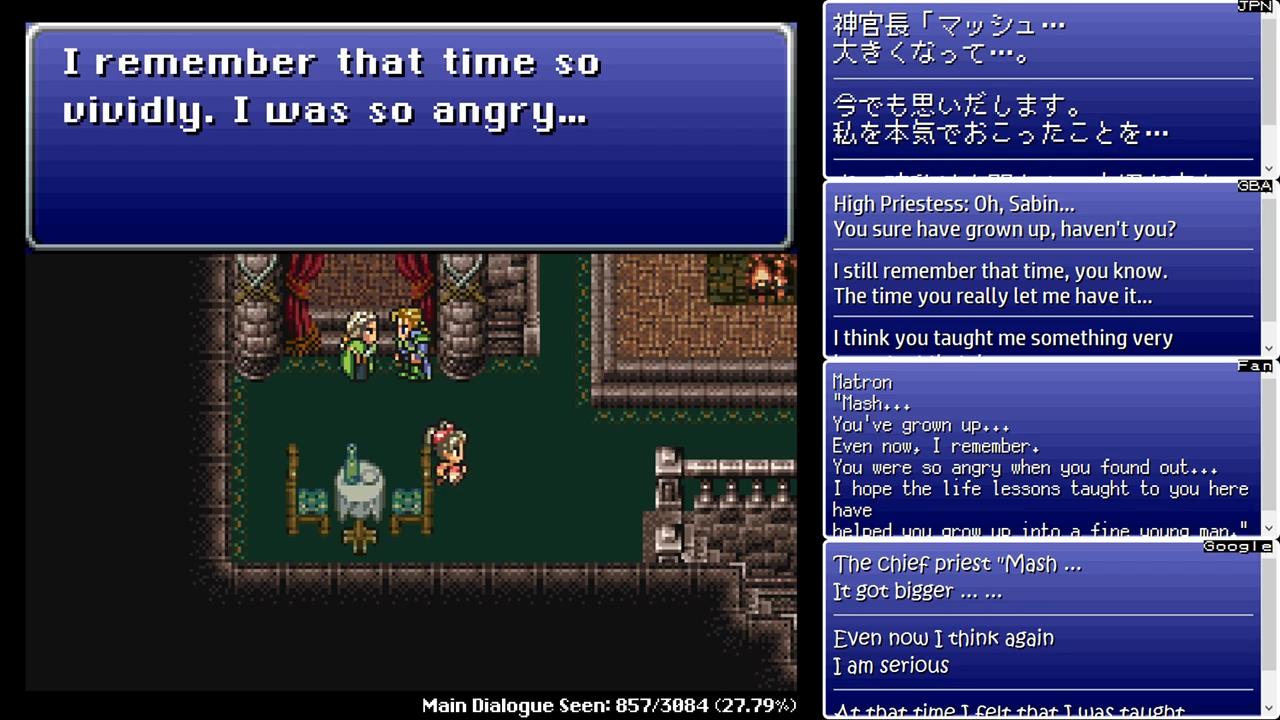
The high priestess/matron discusses how Sabin was so angry at her ten years ago. The Super NES translation makes a mistake here, and says that the matron was angry at Sabin – just the opposite of what happened, in other words. I always felt this part was kind of murky and confusing when I played it back in the day, so I guess that’s partly why.
The GBA translation fixes this mistake, as does the fan translation. In fact, this is a shining example of the fan translation genuinely fixing a problem in the original translation. Unfortunately, the fix isn’t super-obvious and was probably lost on most players, though. Also, the line immediately afterward is mistranslated.
Gentle Eyes
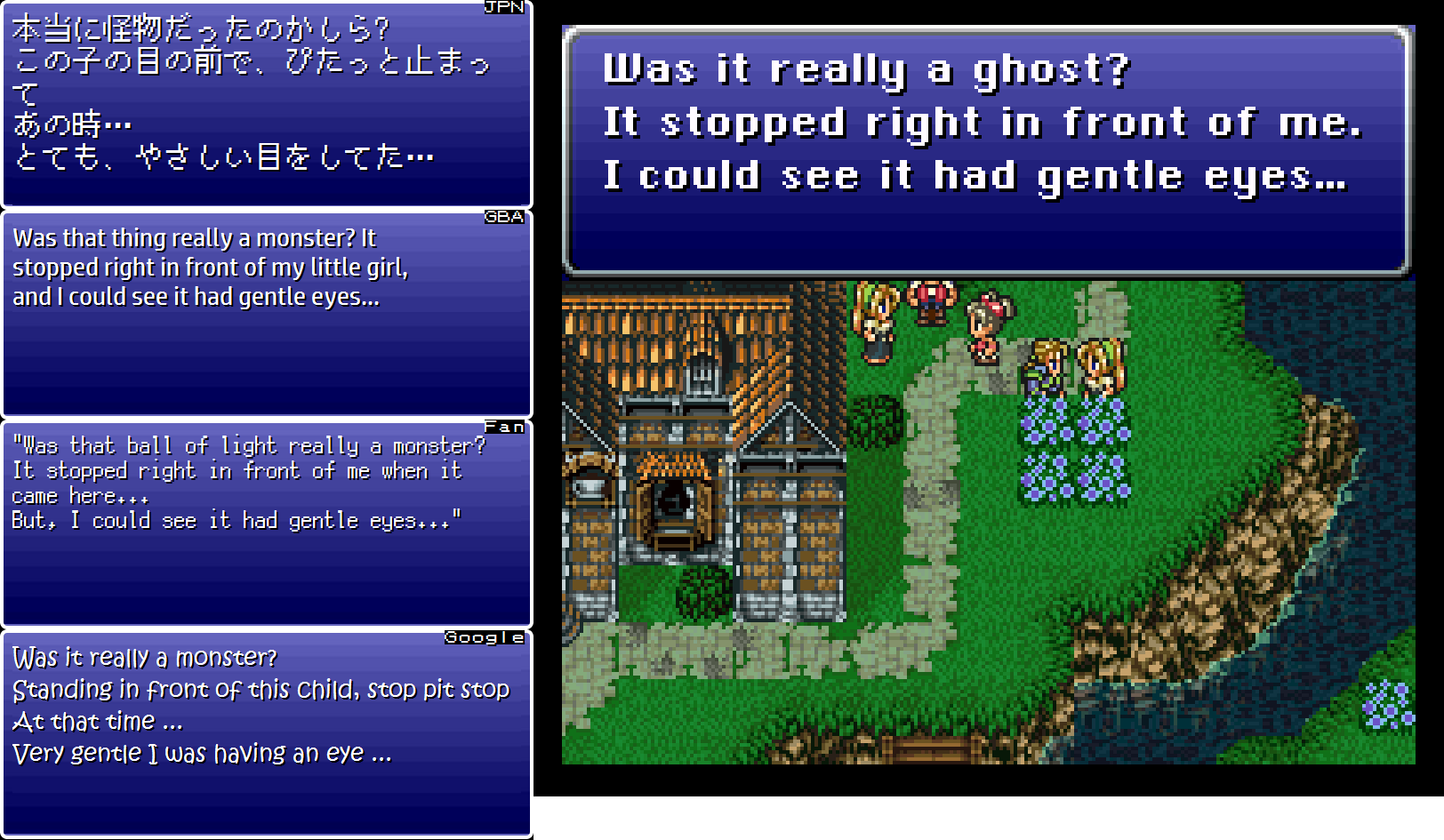
A little girl explains that a glowing monster stopped and looked at her with gentle eyes. The mother also confirms that this happened.
In Japanese, the mom says: “Was it really a monster, though? She suddenly stopped in front of my little girl, and then… She had such a gentle look in her eyes…”
Later in the game, we discover that despite her difficulty relating to normal adults, Terra is great with children and has a strong, protective, and mother-like side to her. She ends up taking care of a bunch of orphaned children after the world gets destroyed, and even fights to protect them. So this NPC text is a little nugget of text that quietly connects with who she becomes later in the game.
The Super NES translation breaks this early connection between Terra and children by mistranslating the line. The GBA translation fixes the mistake, while again the fan translation gets it wrong by pulling from the faulty Super NES translation.
Fighting Words
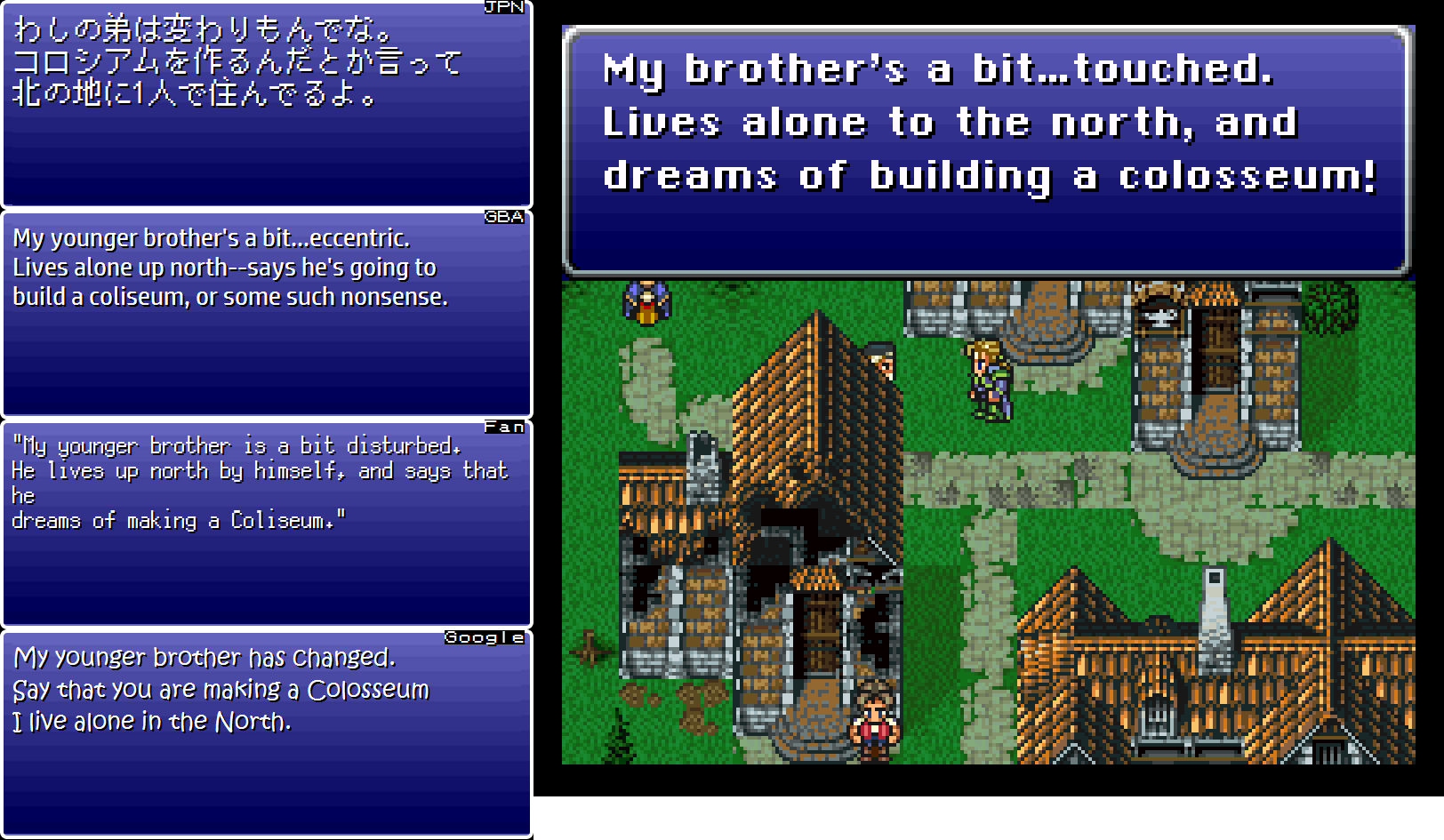
Here we see that some translations use the word “colosseum” while others use “coliseum”. I feel like both spellings are acceptable in English, but “Colosseum” with a capital C refers specifically to the one in Rome. I don’t know if it’s allowed to be lowercased the way we see it in the Super NES translation, but apparently the GBA translator felt that “coliseum” is more appropriate.
Chatters in the live stream also mentioned that British English and American English tend to use different spellings of this word, much like “colour” and “color”. Is that correct? I don’t really know myself.
I personally prefer “coliseum” just because I always mix up which consonant needs doubling in “colosseum” for some reason.
Herb Man
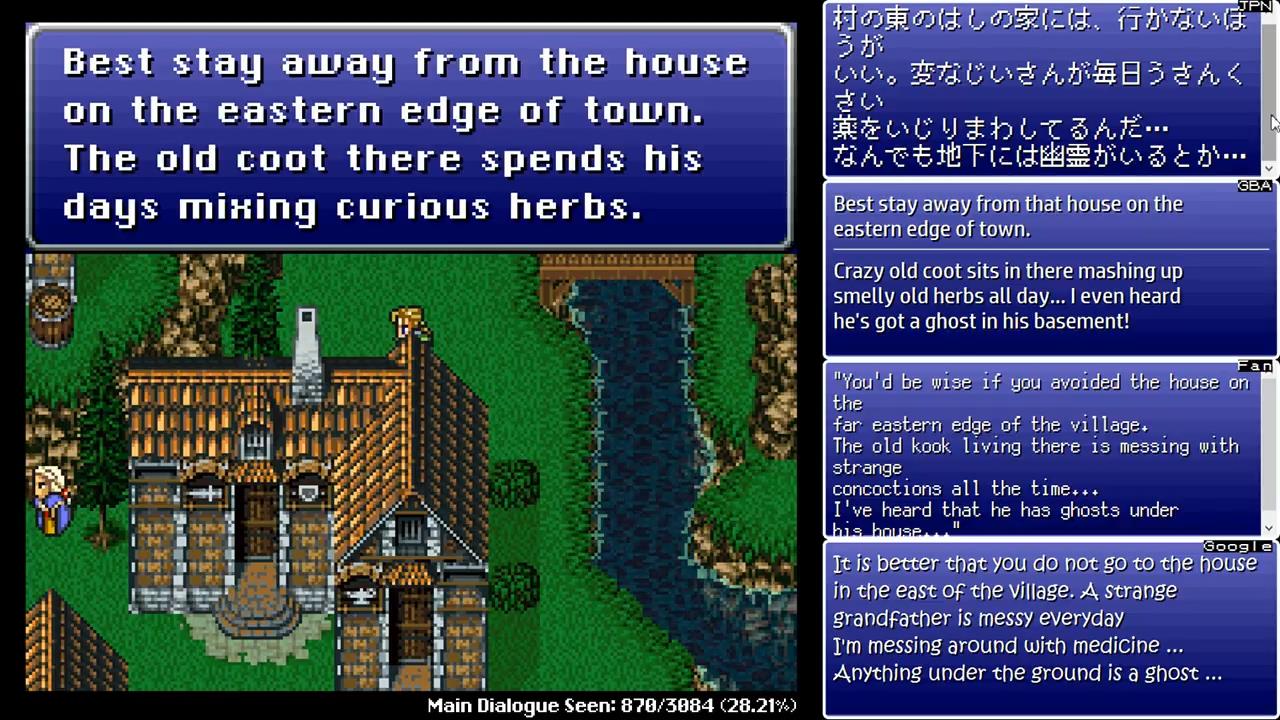
An NPC here mentions that the town weirdo messes with herbs everyday. In Japanese, it’s something like: “You should probably stay away from the house on the eastern edge of the village. A weird old man messes with suspicious medicines there everyday. I’ve even heard he has a ghost in the basement…”
In the Japanese script, we see the word うさんくさい (usankusai) is used. In Japanese, usankusai means that something is suspicious, shady, iffy, or questionable. So this line is saying that the weird old man is messing with some weird stuff.
Unfortunately, the GBA translator made a reading mistake here and translated the word kusai (“stinky”) instead of usankusai. As a result, the weird old man just messes with stinky stuff in the GBA version. It’s not a big change in meaning, but it’s a mistake nonetheless.
The original Super NES translation and the fan translation get this minor detail correct.
Bootleg Assassin
An NPC in town mentions that Shadow is an “assasin” in the Super NES translation. I figured it was an understandable typo… but the very next NPC also says “assasin”!
During the stream, this reminded me of how everyone has certain words they get wrong often. I used to spell “cemetery” as “cemetary” all the time, for example. Other chatters shared some of their own chronic misspellings. If you have some words you get wrong a lot too, share them in the comments – it’s a phenomenon I rarely get to talk about and would love to learn more!
Also, this reminds me of another thing: a lot of kids learn new words – and their spellings – from wordy games like JRPGs. So I wonder if this “assasin” thing led to a rise in “assasin” misspellings afterward in schools.
In a similar way, I remember learning the word “populous” from the Super NES version of Populous, and decided to use it in in a school report. Except I got it wrong – I was actually supposed to use the word “populace” in that situation. That single little misspelling has remained in my memory ever since. Somehow video games can make powerful memories, even with tiny things.
More Typos
A few other typos popped up during this day’s stream. I only recall two now:
- The fan translation says “That I loved him all my heart” – the word “with” should be after “him”
- The Super NES translation says “Let’s buy lot’s of stuff today, too!” – there shouldn’t be an apostrophe
Typos are the kind of surface problem “afterthoughts” that I discuss on my About page. They don’t necessarily mean a game’s translation is faulty or bad, but they’re one of the few things that non-translators can pick up on. They’re also why editors are such unsung heroes of the localization process. After all, relying entirely on automated spell-checkers is a recipe for disaster!
Deadly Proposal
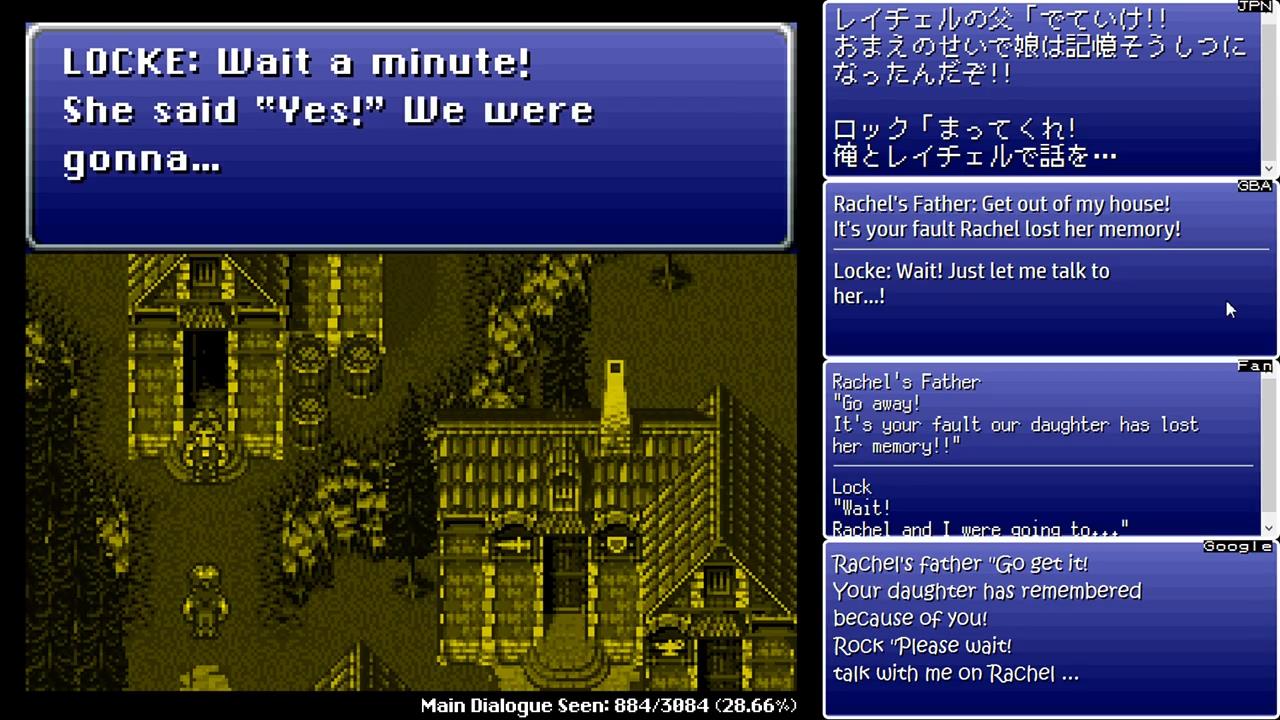
During the Super NES translation of this important scene, Locke says to Rachel’s father:
Wait a minute! She said “Yes!” We were gonna…
The original Japanese script says nothing of the sort though. It’s simply:
Wait! Let me talk to Rachel…!
The GBA translation changes the line back to the originally intended one. The fan translation doesn’t really get it right, but it’s kind of understandable, as the second sentence is an incomplete sentence and requires Japanese language experience to fill in the blanks.
Although the Super NES translation adds in a whole thing about Rachel agreeing to marrying Locke, it’s very plausible that the original scene was about to lead into a marriage proposal had Rachel’s accident not happened. It’s possible that the Super NES translator asked the writers for details about the scene and adjusted the text accordingly, but it’s more likely just an addition out of the blue.
I feel like this is something that official Japanese novels or manga or interviews might explain in more detail, so if you know anything about this, let me know!
Underground Corpse Party
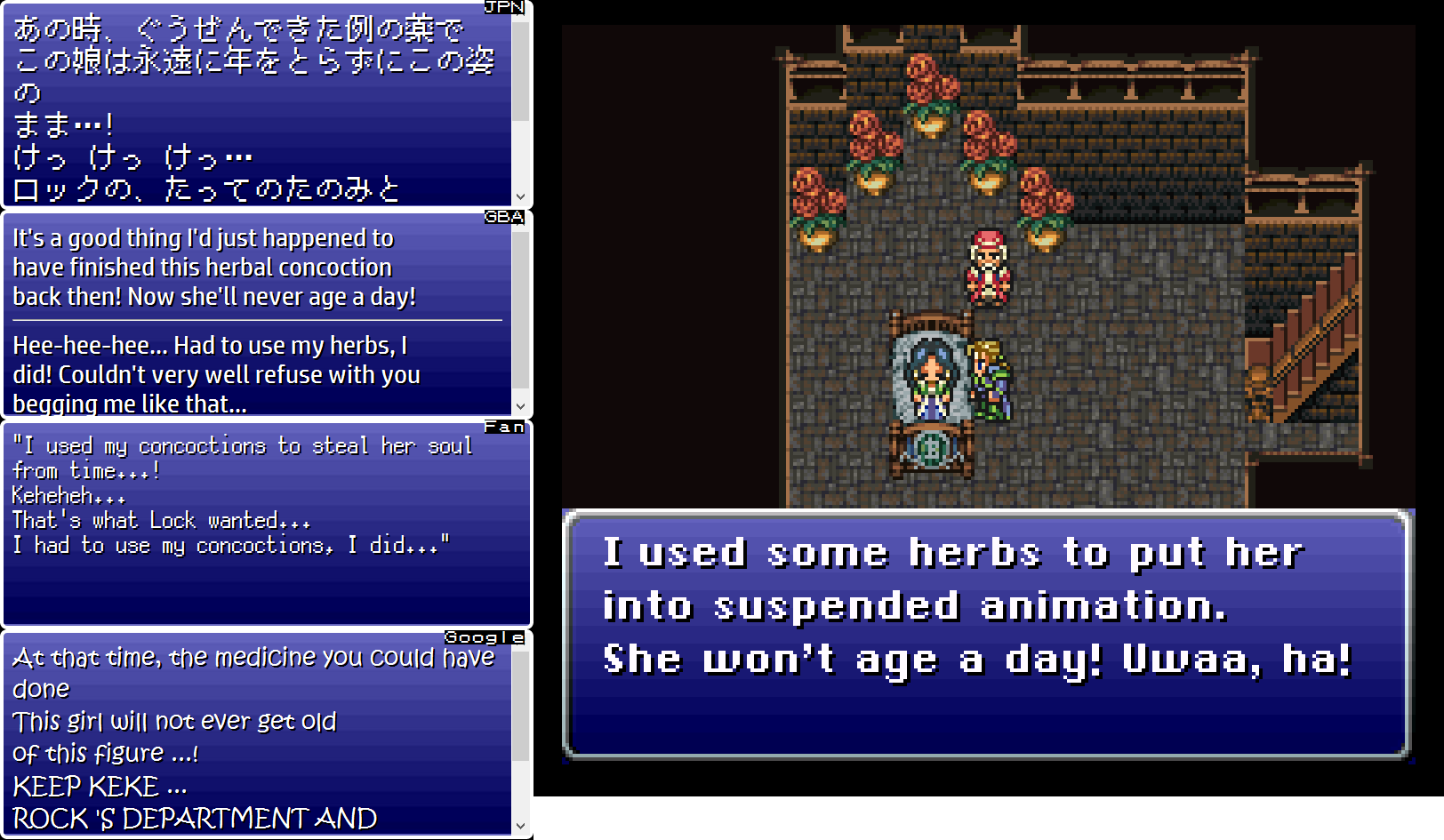
The Super NES translation here isn’t too bad, but the GBA translation of this line is by far the closest to the original text and includes details that originally had to be cut out due to space issues.
The fan translation is really weird, though: “I used my concoctions to steal her soul from time…!” As we learn immediately afterward in the Japanese version, the weird herb man has preserved Rachel’s body and only her body. Her soul is gone. More on this a bit below.
Medicine Man
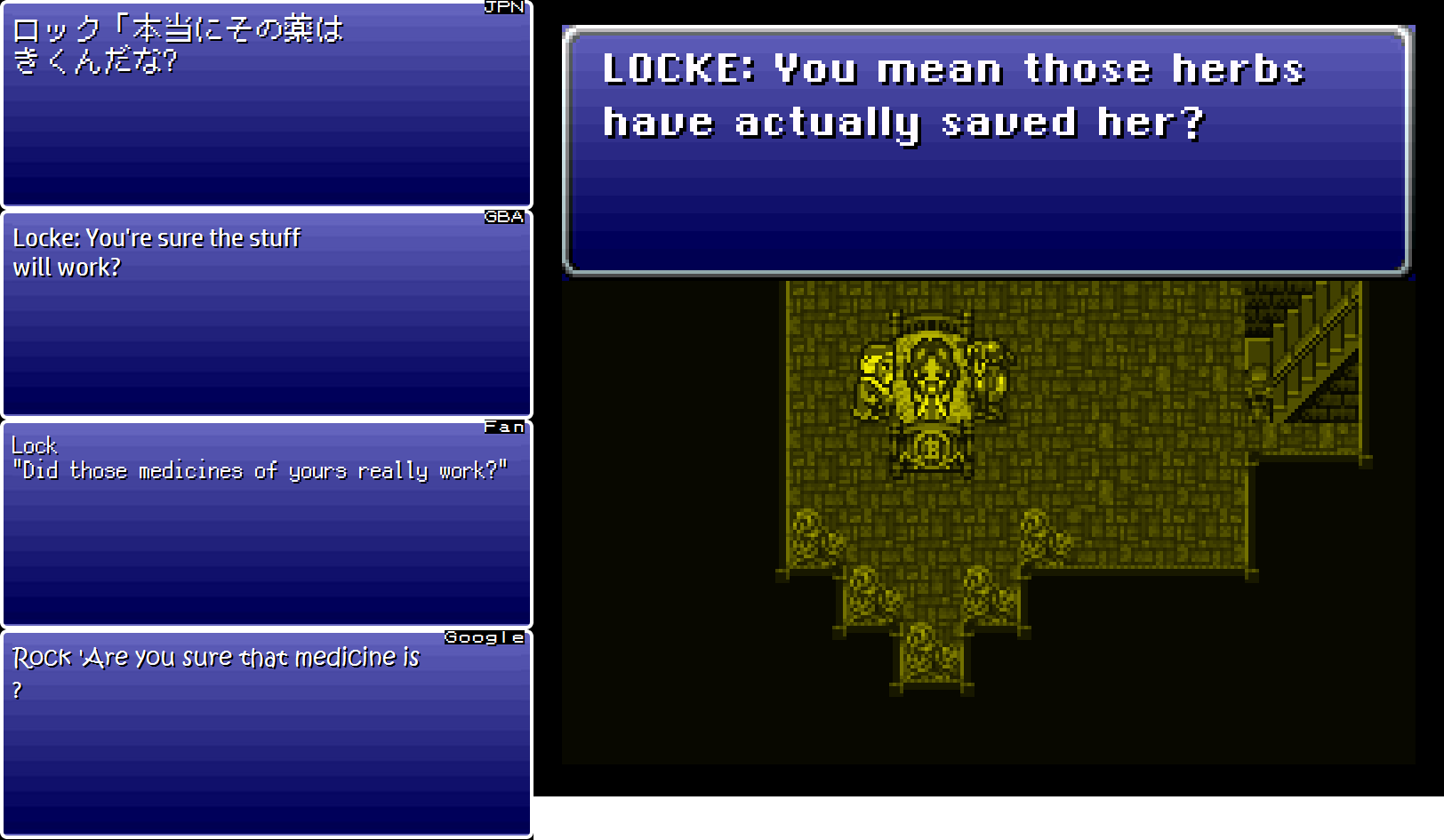
A lot of the text surrounding Rachel’s death, preservation, and hope for revival gets messed up in the Super NES translation. In addition to everything we’ve seen so far (and everything covered during the stream), this line also gives some false impressions.
In Japanese, this line is something like, “This medicine is really going to work, right?” or “Are you sure this medicine will work?”. Basically, Locke is a little uncertain that this weirdo’s iffy concoction will actually do what it’s supposed to do.
The Super NES translation changes this entirely and clears up Locke’s doubt about the medicine’s effectiveness – it’s already proved itself effective and has saved Rachel. The line was also changed and framed as a past event, when the original question is more of a general present tense or future tense idea. This isn’t a huge deal by itself – I only bring it up because we can see that the fan translation does the exact same thing as the Super NES version.
The GBA translation is the closest to the original line, and even the machine translation is on the right path despite not completing its sentence.
Cut It Out
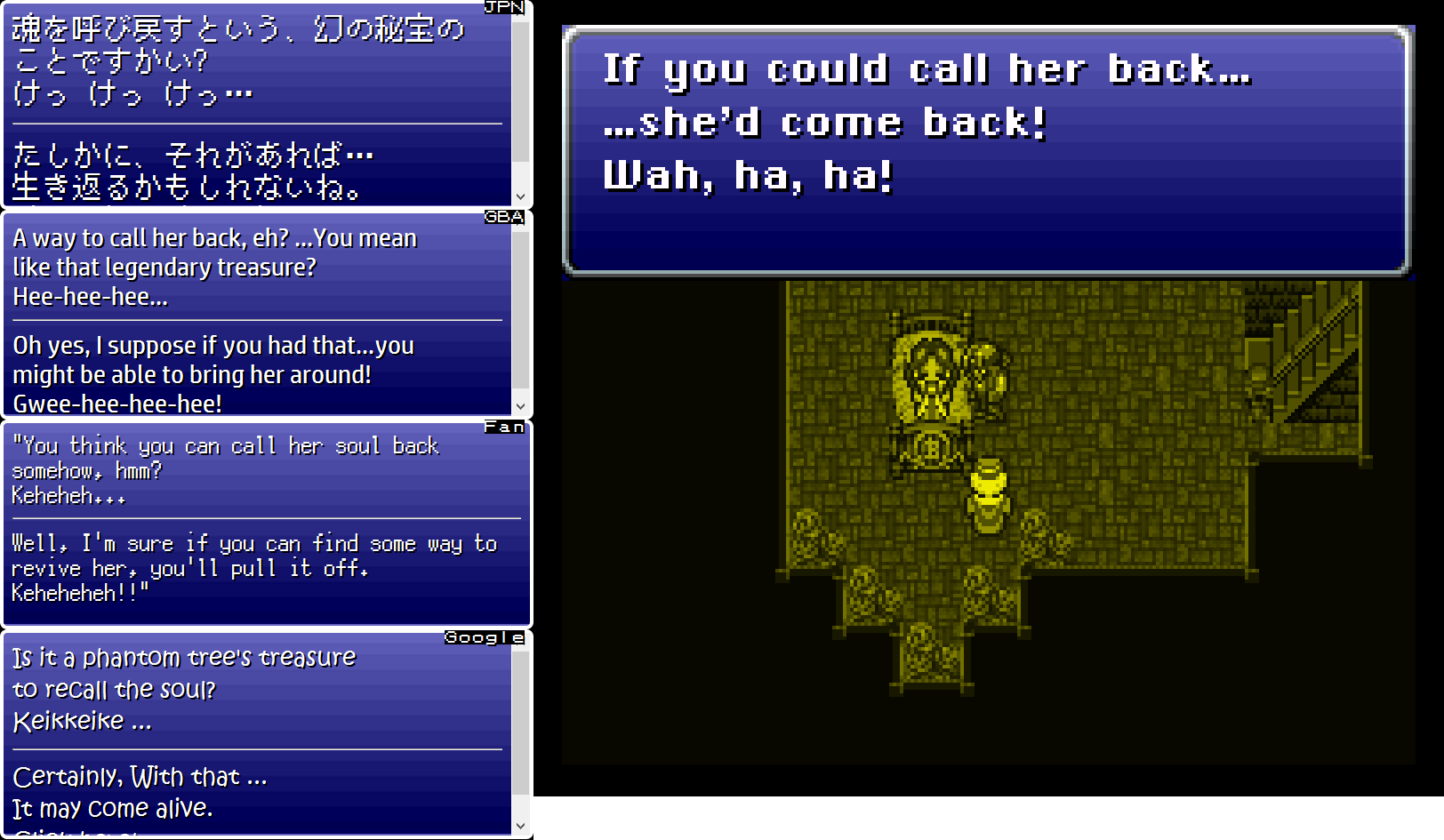
Locke asks if there’s some way – any way – to bring Rachel back somehow. The old weird guy says in Japanese:
Do you mean the mythical secret treasure that’s said to call souls back?
This clearly suggests that there’s potentially a way to bring Rachel back, and since she’s obviously still not alive at this point in the present day, the player might assume that this hidden treasure will be obtainable at some point. And the astute player might consider that Locke is hoping to find this hidden treasure someday during his treasure hunting travels.
The Super NES translation changes this weird guy’s text entirely. In response to Locke’s question about finding a way to bring Rachel back, he says:
If you could call her back… …she’d come back!
That really doesn’t say much and is clearly not what the original script said. Players aren’t given a hint that some hidden, soul-returning treasure exists, and some of Locke’s potential backstory goes missing. And it’s pretty clear that the fan translation is simply a rephrasing of the faulty Super NES translation.
There’s more to this issue, though. In the Japanese script, a man in the very next town offhandedly mentions “a hidden treasure that can revive souls” and how there’s a rumor that it’s in the imperial capital:
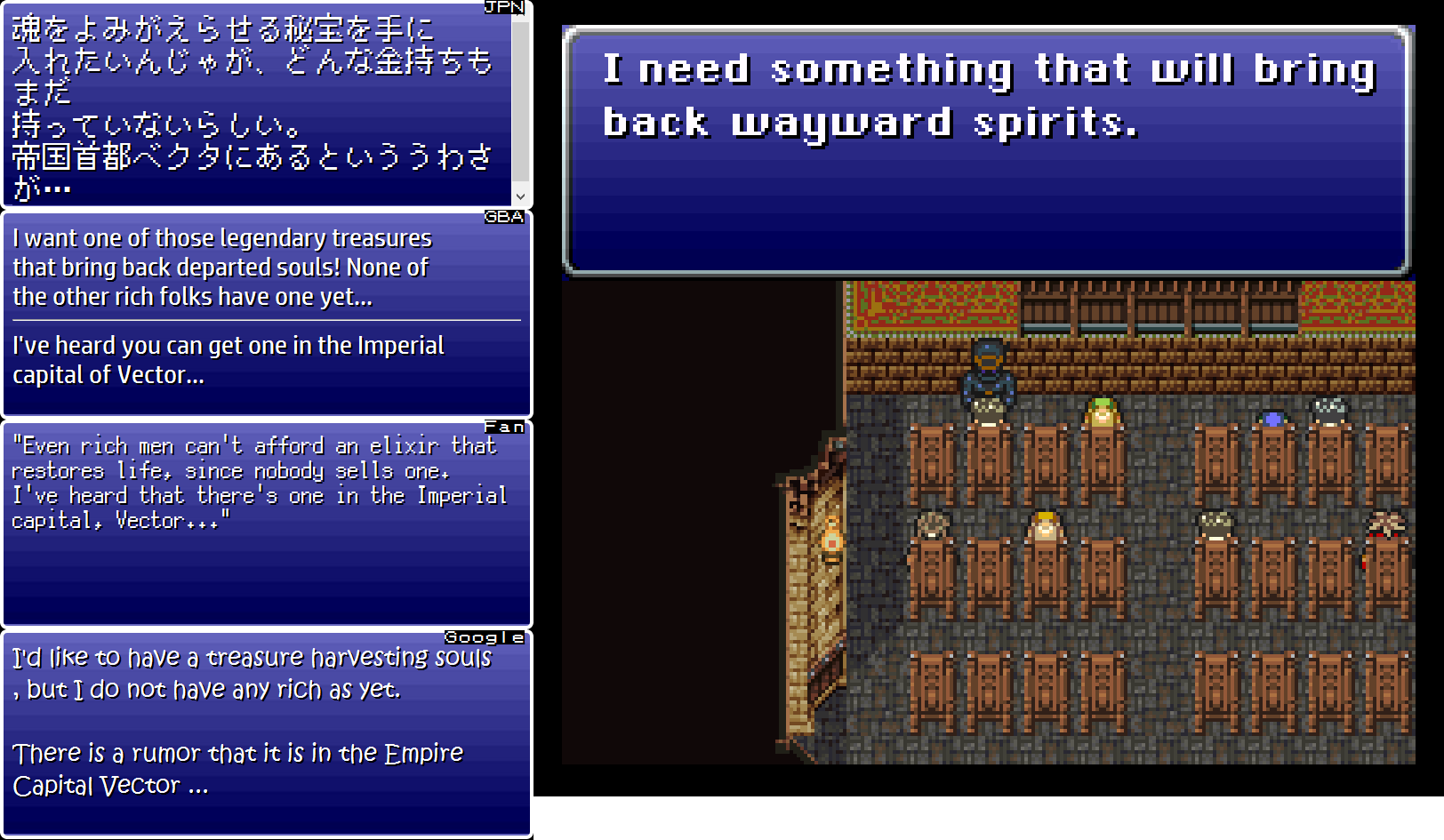
This information, so soon after the first hint in the previous town, tells the player that there’s almost definitely going to be a way for Locke to finally revive Rachel.
Unfortunately, this exact information isn’t found in the Super NES translation. This line is rephrased just enough that the connection to Rachel is murkier, while the connection with the weird old man’s hint is lost entirely. I don’t think I connected this Super NES line with the whole Rachel thing until after at least one or two playthroughs of the game, in fact.
Also, similar to the earlier Kohlingen foreshadowing of how Terra changes in the World of Ruin, this Kohlingen/Jidoor “hidden treasure of revival” talk also sets up what Locke will eventually be doing too. I never really noticed that before.
Wealthy Bumpkins
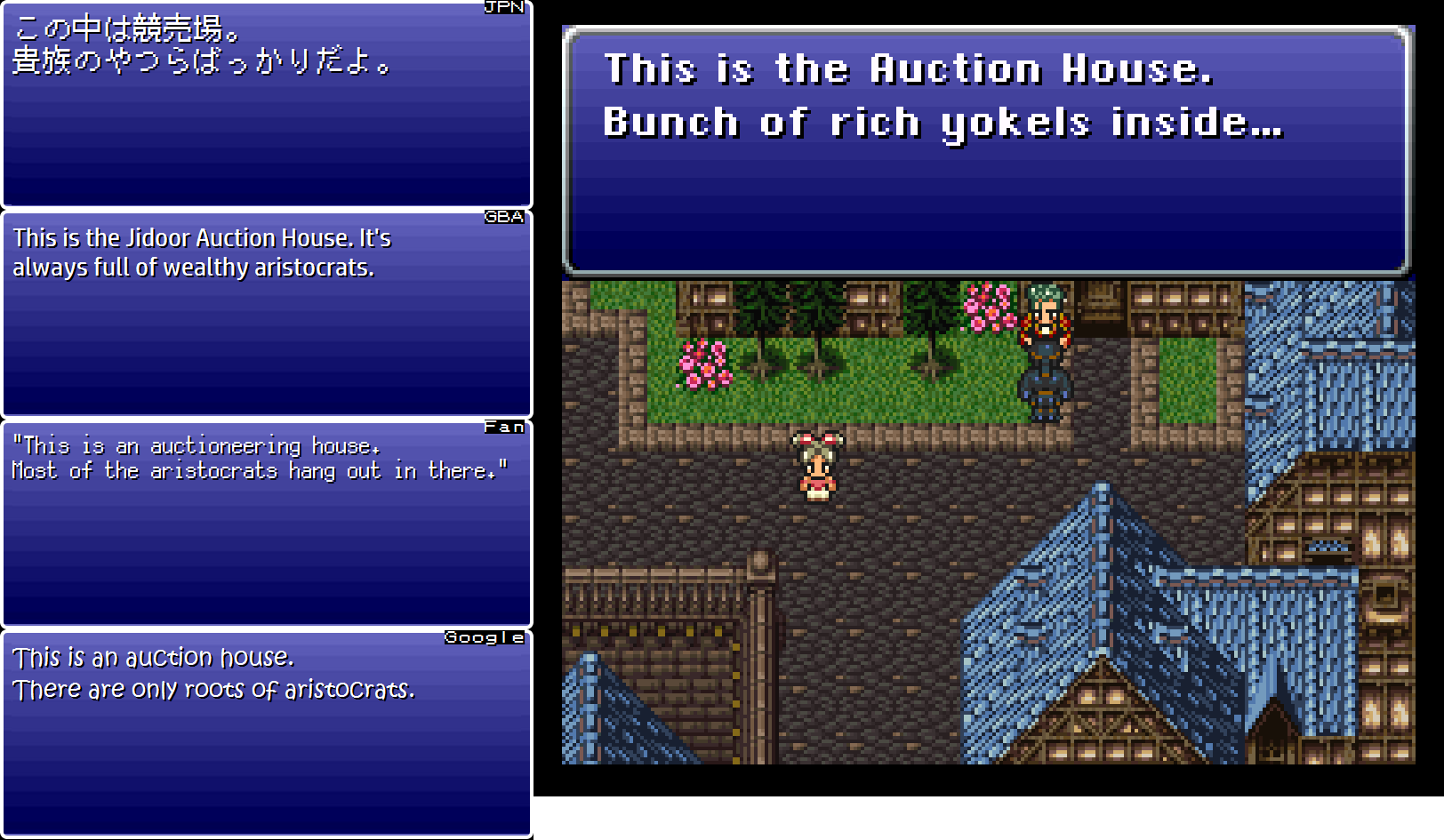
In Japanese, this guy says something like, “Inside here is the auction house. It’s filled with a bunch of aristocrats.”
The Super NES translation says something slightly different: instead of “aristocrats”, it says “rich yokels”. But as Poe pointed out during the stream, this doesn’t make sense – the word “yokel” refers to unsophisticated rural people. So “rich yokels” is a strange phrase that suggests everyone inside is a member of the Beverly Hillbillies TV show or something.
The people inside the auction house are clearly not unsophisticated rural people, though, so the Super NES translator was either trying to make a joke that didn’t quite work, or didn’t really understand what “yokel” means in English. Based on past experiences, my bet is on the latter.
X-Men Fanfic VI
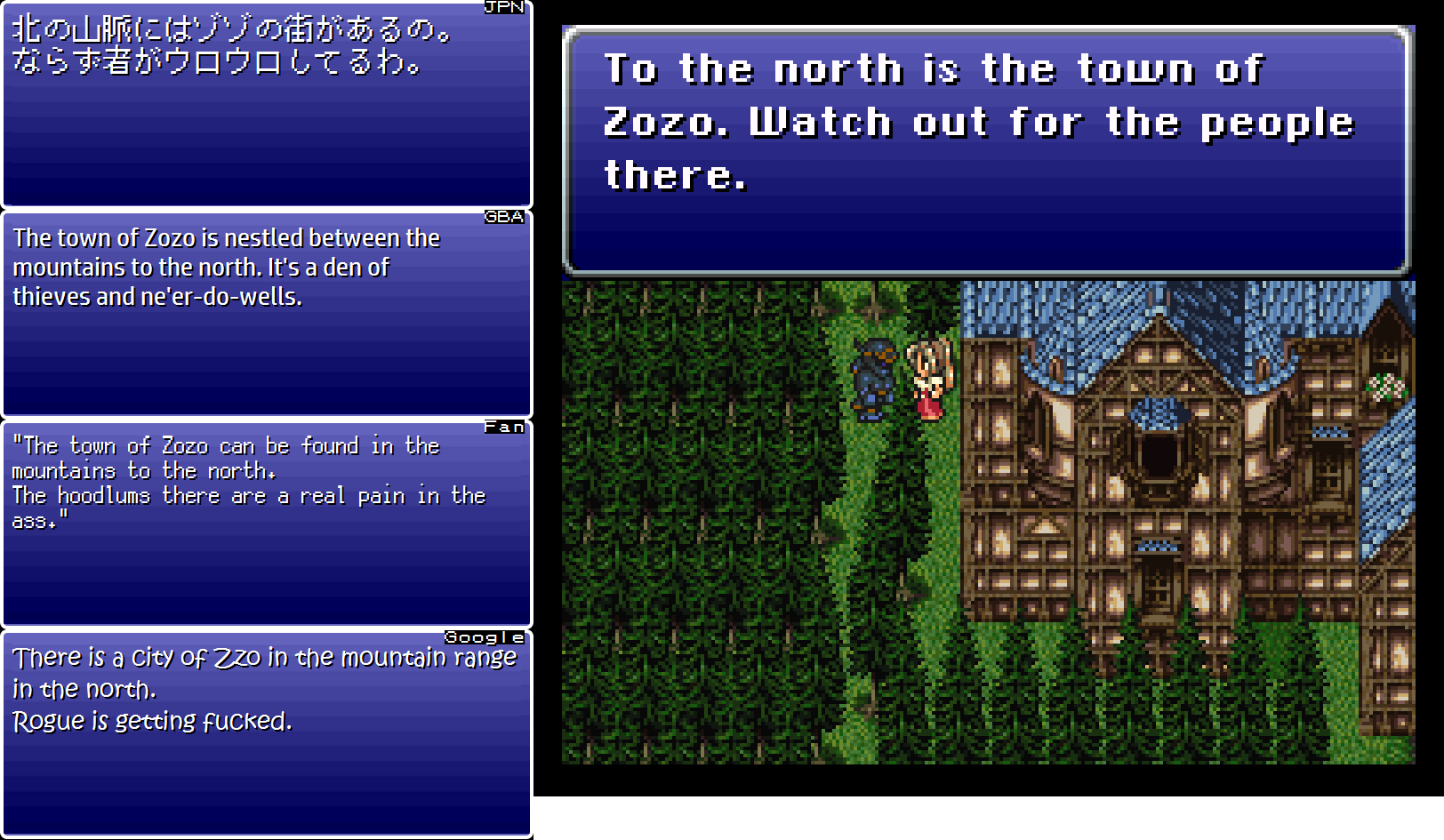
The Google translation goes off the rails with this line. The “rogue” part makes sense, as ならず者 (narazumono, "scoundrel, thug, a person up to no good") appears in the original Japanese text. I’m not quite sure how Google turned ウロウロ (uro uro, "hanging around") into the F word though.
Cool Clyde
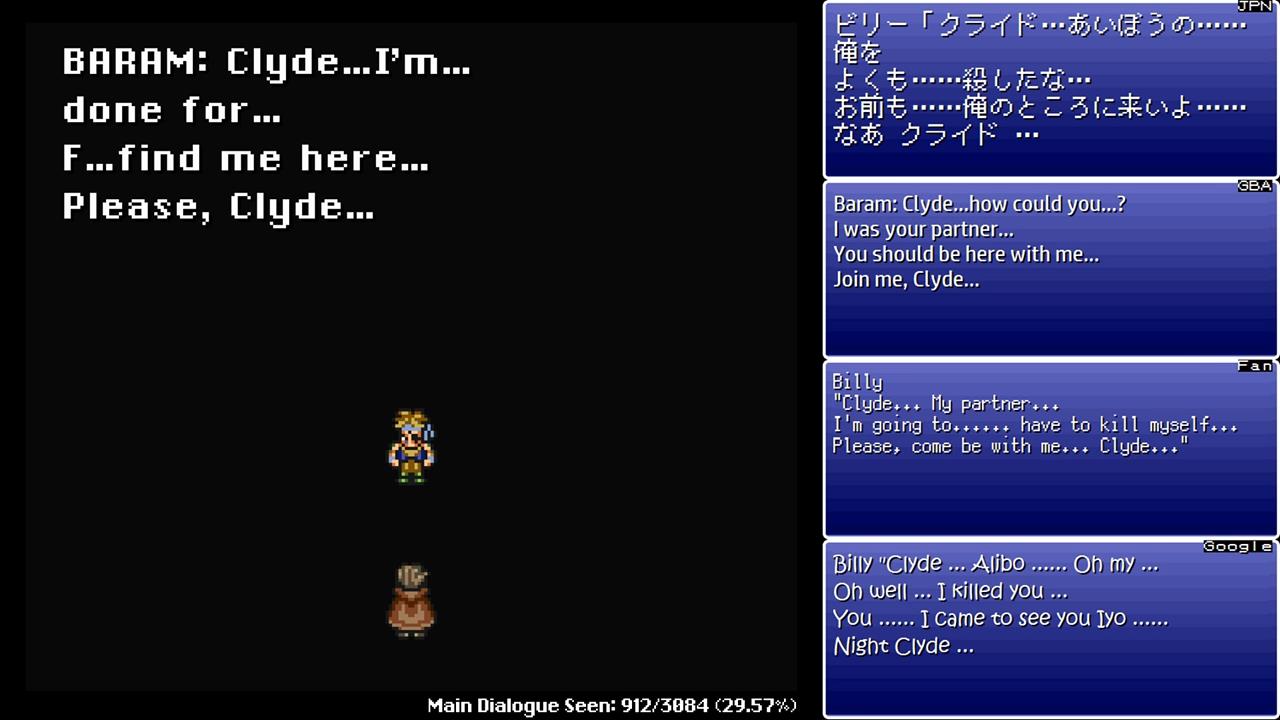
We lucked out and managed to see one of Shadow’s secret dreams during this stream. In this one, the Japanese text says something like:
Billy: Clyde… How dare you kill me… your partner…
It’s time for you… to join me…
C’mon, Clyde…
The Super NES translation mangles this translation into something completely different, partly because of Nintendo’s content policy regarding the word “kill” at the time. The new line really changes the scene and even gives the false impression that he’s asking players to search the world to find him. I bet this confused many players and sent some on pointless searches for hours and hours.
We also see that his name was changed from “Billy” – a name you’d probably expect from a Wild West outlaw – to “Baram”. I’m not sure why this change was made or why “Baram” was chosen specifically.
The GBA translation fixes this entire line and puts it in line with the original text. Except he’s still called “Baram”.
The fan translation gets this line so wrong that it’s impressive.
Hello Real World
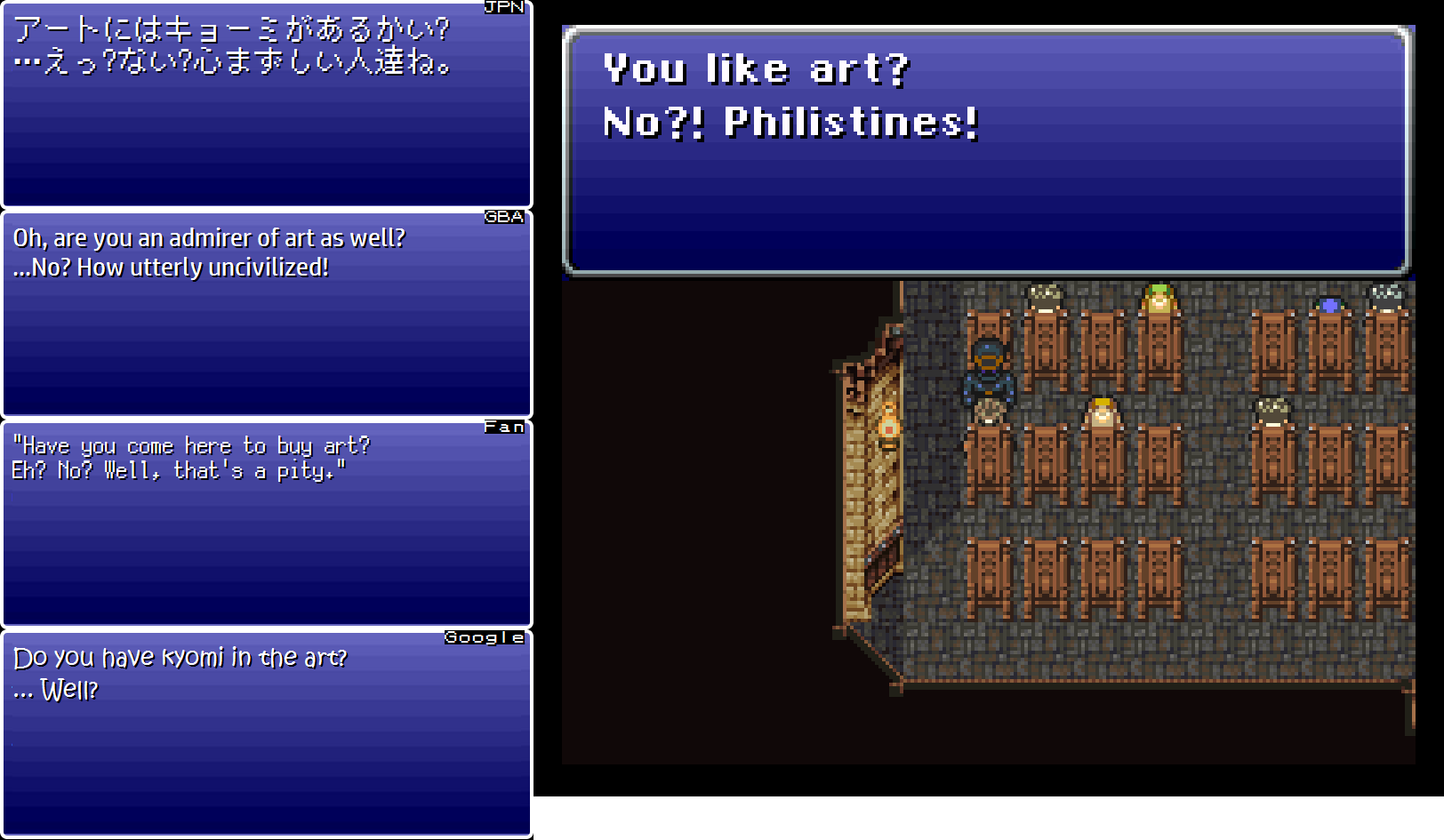
In Japanese, one of the rich snobs in the auction house insults the heroes and calls them “narrow-minded” for having no interest in art.
In the Super NES translation, it feels like this line was condensed down to be as short as possible. The insult was also changed to “Philistines!”. Back when I first played the game, I didn’t fully understand this word, but from context it was generally clear that it meant something like “unsophisticated”. Here’s what it means, incidentally:
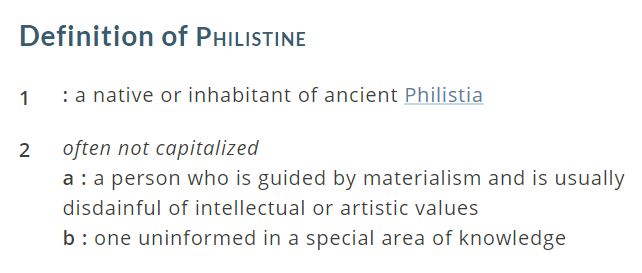
Since the term technically references a group of people from real-life history, it seems weird to see it appear in this fictional world. The GBA translator felt the same way and replaced the “Philistines” reference with “How utterly uncivilized!”. The fan translation gets the line wrong.
Poor Translation
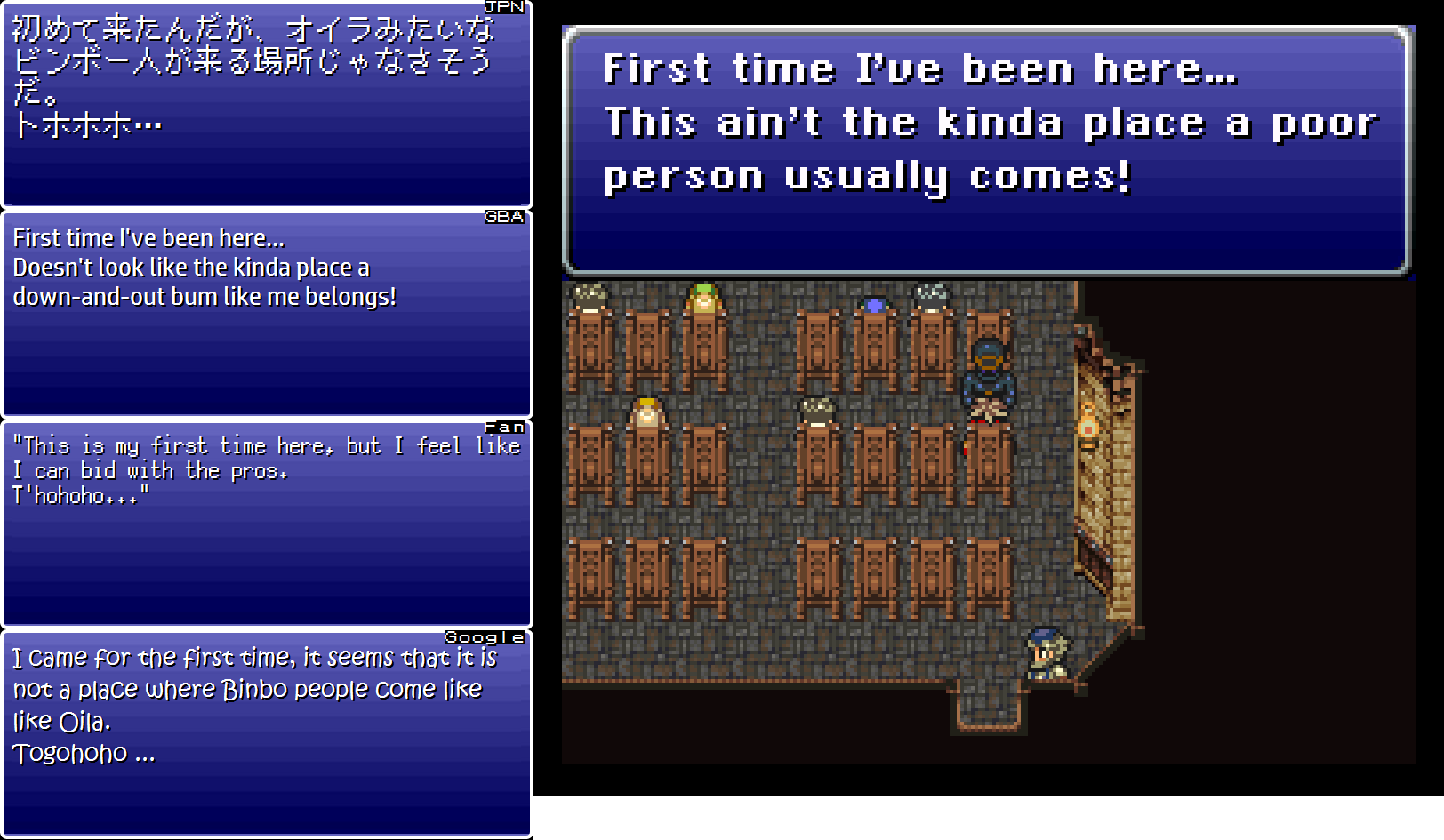
The auction house is full of rich, snobby people, but one lower class ruffian is hanging out by himself. In Japanese, he says: “This is my first time here, but it doesn’t look like it’s the sort of place for a poor person like me. Tohohoho…”
The Super NES and GBA translations are pretty close to the original text, but we see that the fan translation gets the line really wrong.
More interesting to me, though, is that the “tohohoho” part is missing in the official translations but was mostly kept intact in the fan translation.
The Japanese phrase tohoho is something akin to “boo-hoo” or “*sigh*” in English, and shouldn’t be left as-is, however. So in this regard, everyone sort of gets it wrong, although I partly wonder if the GBA translator left it out purposely and not accidentally. Meanwhile, poor Google just changes the sound altogether.
Also, as I mention in the stream, this character uses the pronoun oira to refer to himself. In this context it suggests an unsophisticated bumpkin-like quality, but it can evoke other images in other situations. I’ve been slowly working on a giant article about all the different Japanese pronouns, and Final Fantasy VI has been a treasure trove of helpful examples for it!
Lying Times
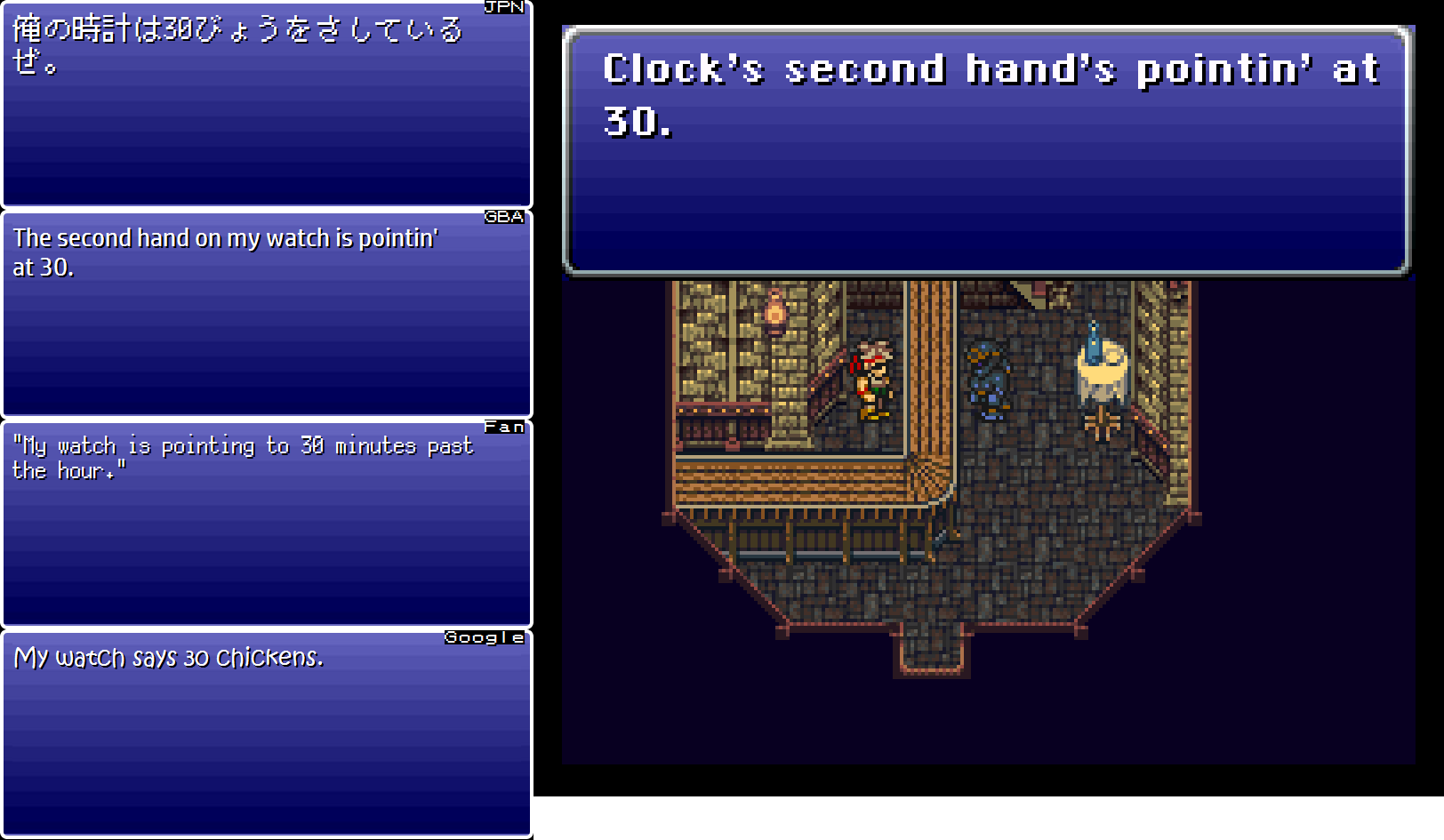
The town of Zozo is full of liars (which makes this place a lot like Moonside now that I think about it), so when they start giving you clues about a clock-related puzzle, you have to pay extra close attention.
This particular clue refers to the clock’s second hand, as in the hand that points to the seconds of time. But the fan translation gets the clue wrong and refers to the minute hand instead.
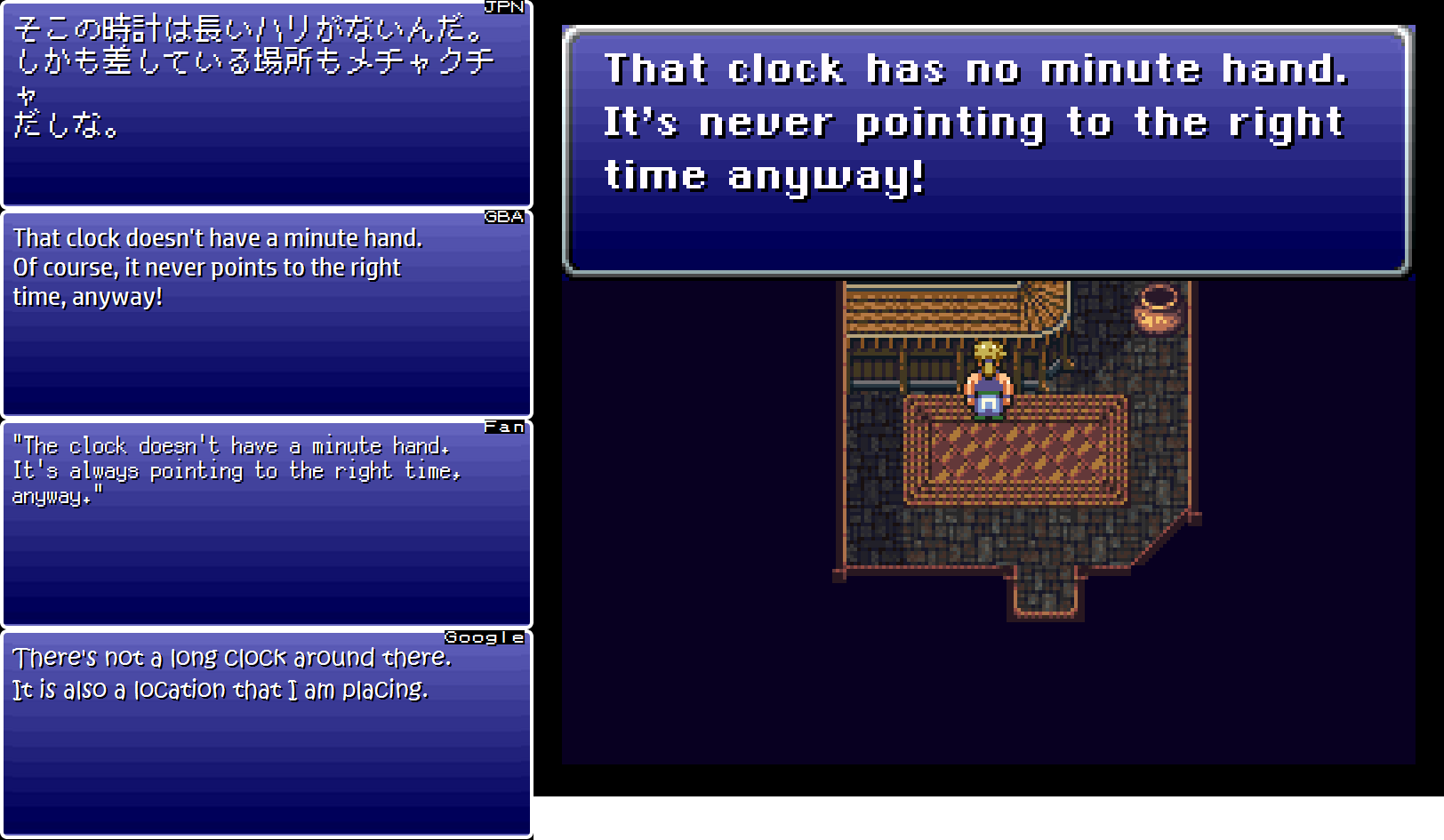
This second clue mentions that the clock never points to the right time… but the fan translation completely reverses that hint and says it always points to the right time.
Both of these instances result in mistranslated puzzle clues. Given the nature of the puzzle, I assume these mistakes probably don’t matter. Plus most fan translation players will be longtime fans who already know the answer to the puzzle. But mistranslating gameplay clues is one of the worst mistakes a game translator can commit.
Also, it goes without saying that with puzzle hints like this, you probably can’t rely on machine translations at this point in time. Unless you know how to convert chickens to seconds.
Yellow Cherries
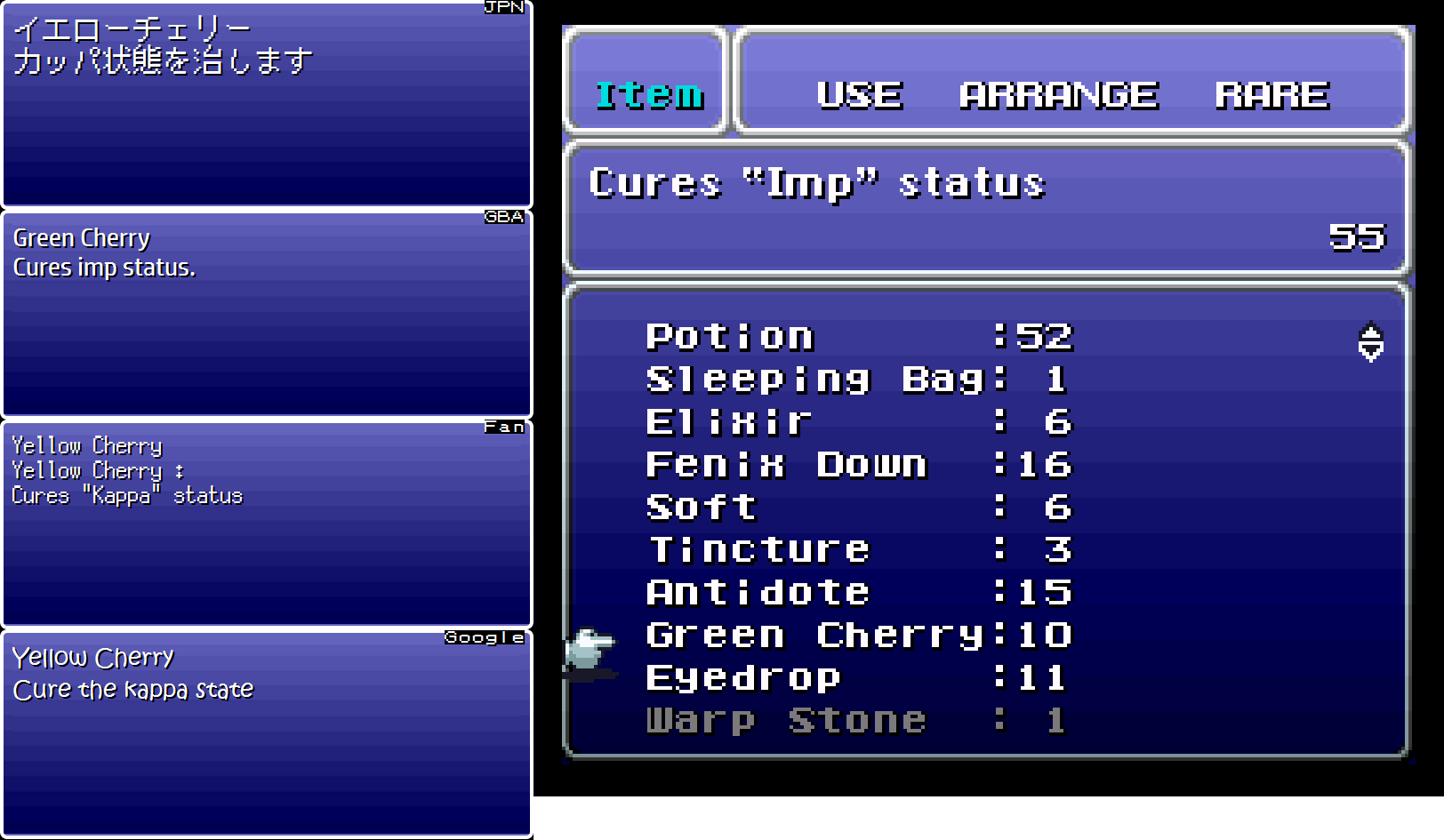
Back in Day 1 or 2 I pointed out that the “Yellow Cherry” item was renamed the “Green Cherry” in the official translations. I wasn’t sure why the change was made, but I also wasn’t even sure why the original item was called a yellow cherry in the first place. Regardless of the name change, though, the item still cures the kappa/imp status ailment.
Well, I decided to look into it and the answer immediately popped out after a single search, but it takes some explaining.
First, a Japanese sake (rice wine) company called “Kizakura” has been around for about 60 years. It’s had commercials since the beginning of television in Japan, and its mascot is the kappa. The Kizakura kappa commercials also feature an old, catchy jingle that’s very kappa-tastic:
Kizakura does different marketing these days, but from what I can tell, the animated kappa commercials were especially famous in the 70s and 80s.
So why bring all this up? It’s because kizakura means “yellow cherry” in Japanese, referring to cherry trees and/or cherry blossoms. And because this connection between kappas and the “yellow cherry” name has been in Japanese pop culture for so long, it’s ripe for referencing in other media – like in a game, in this instance.
The timing of the commercials’ popularity also explains why the developers were familiar with Kizakura kappas while the reference was lost on the younger target audience. During my research, I noticed a few instances of “Oh! So that’s why it’s called ‘Yellow Cherry’!” from Japanese fans. Now we know too!


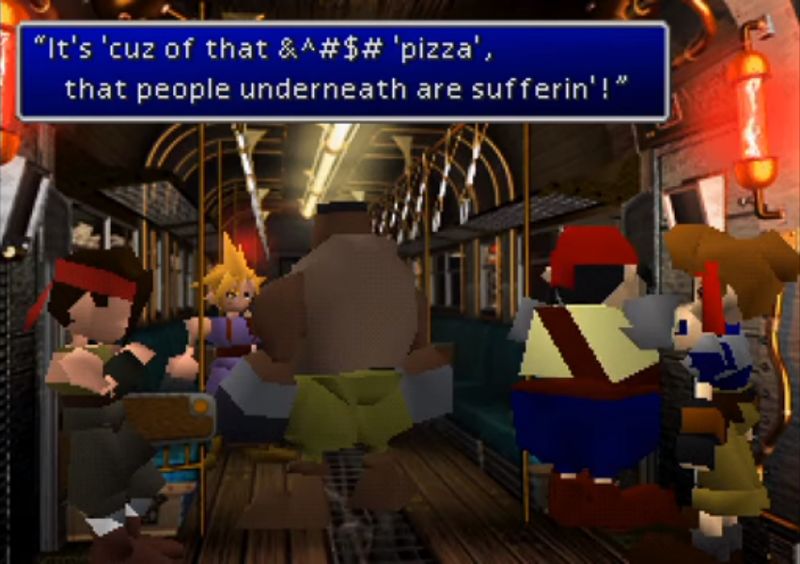
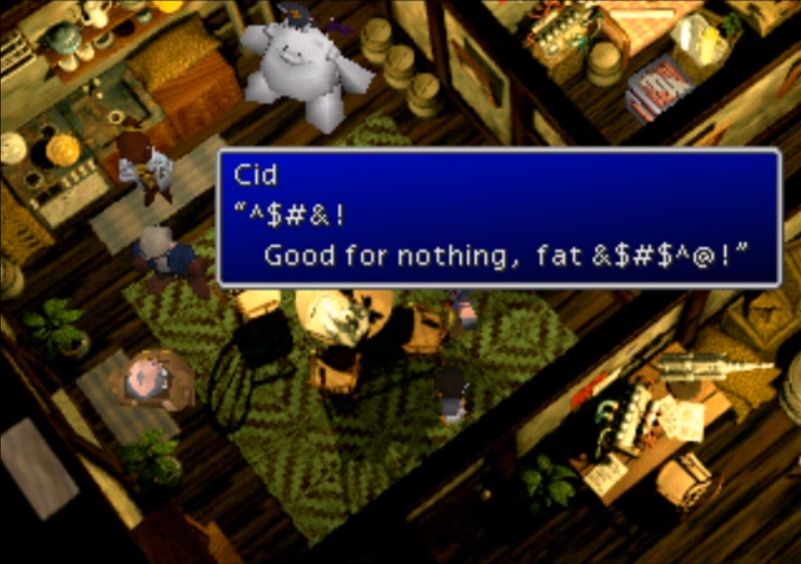
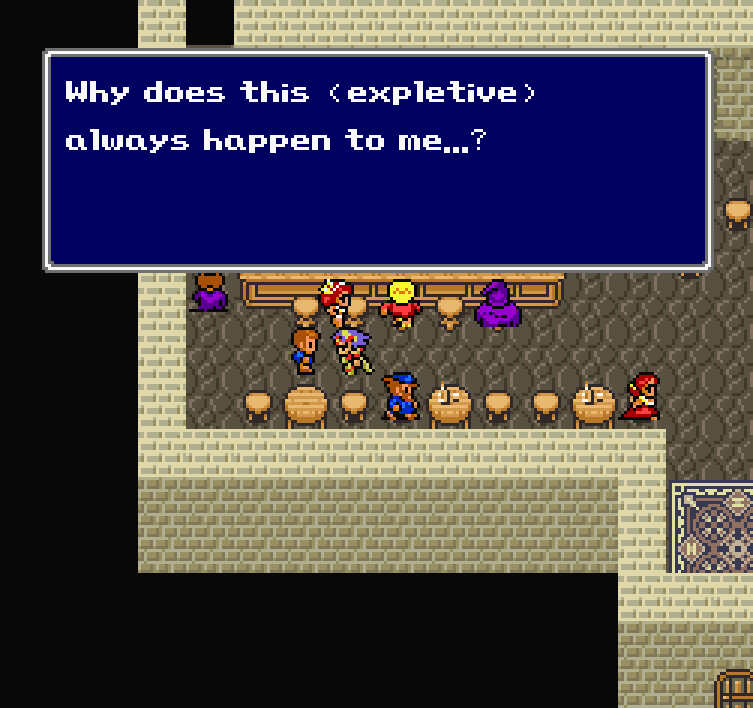
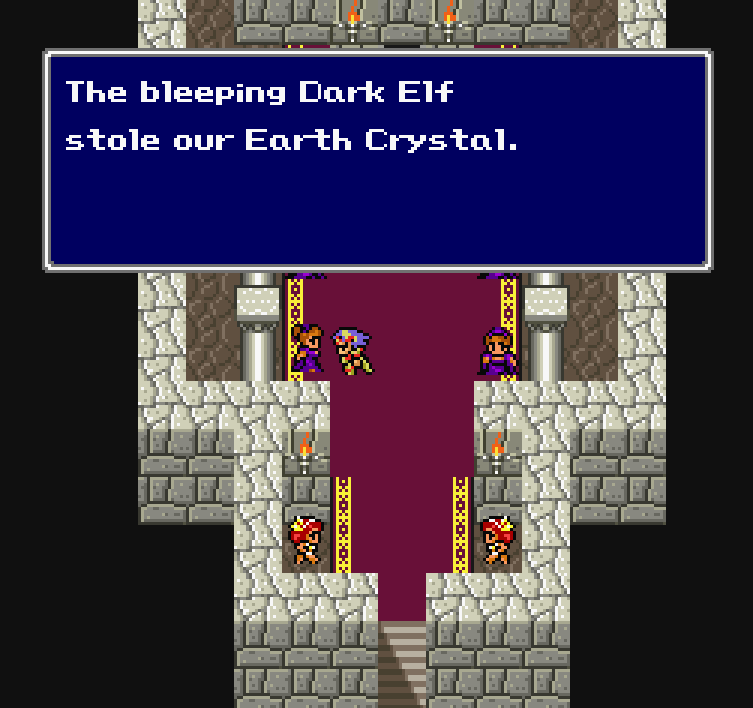
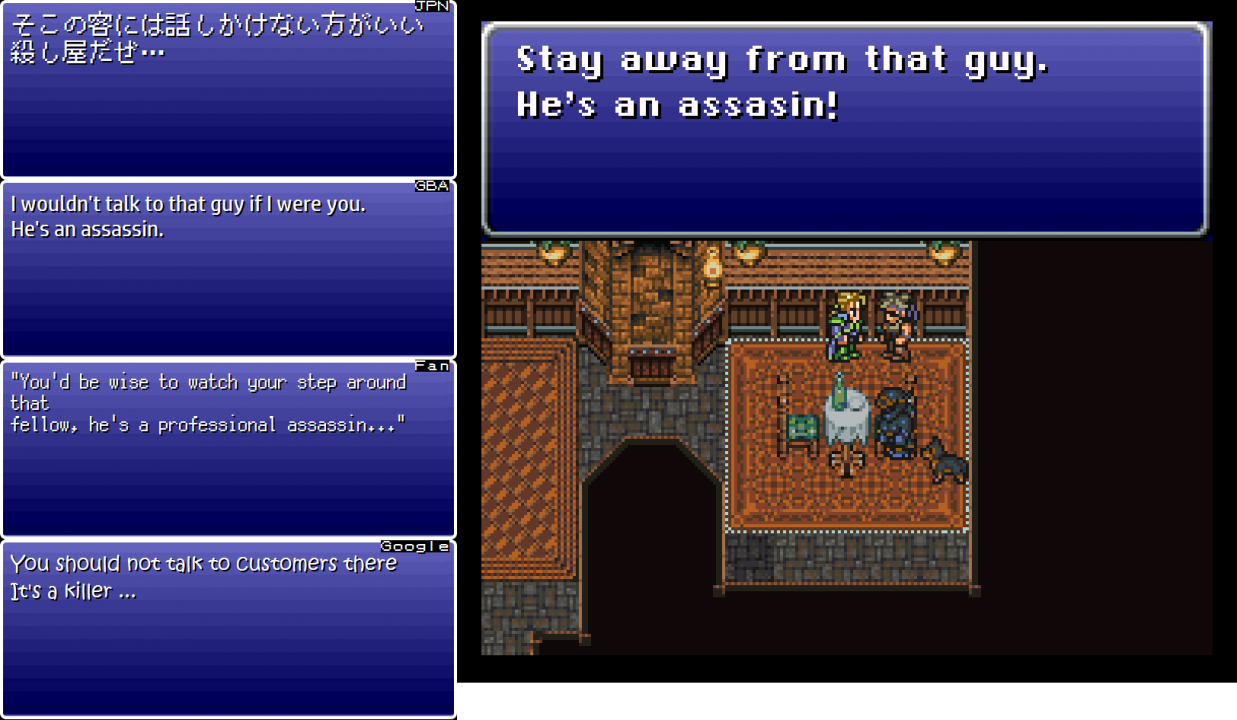
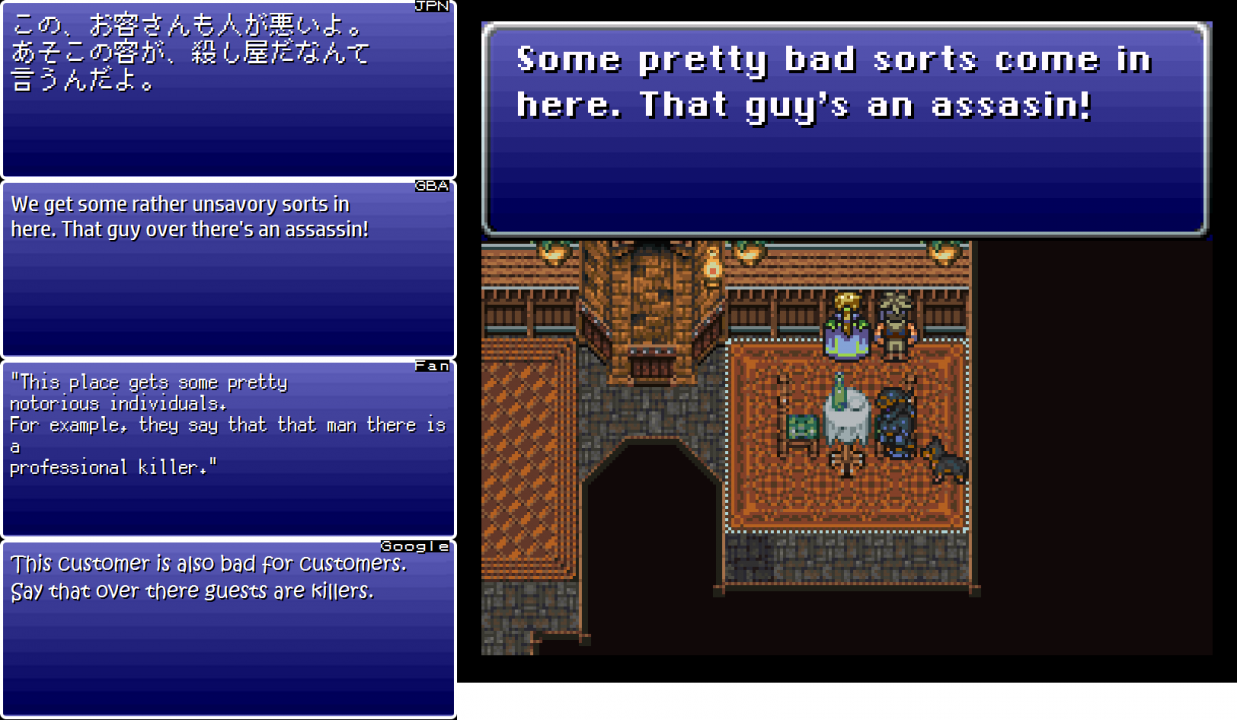
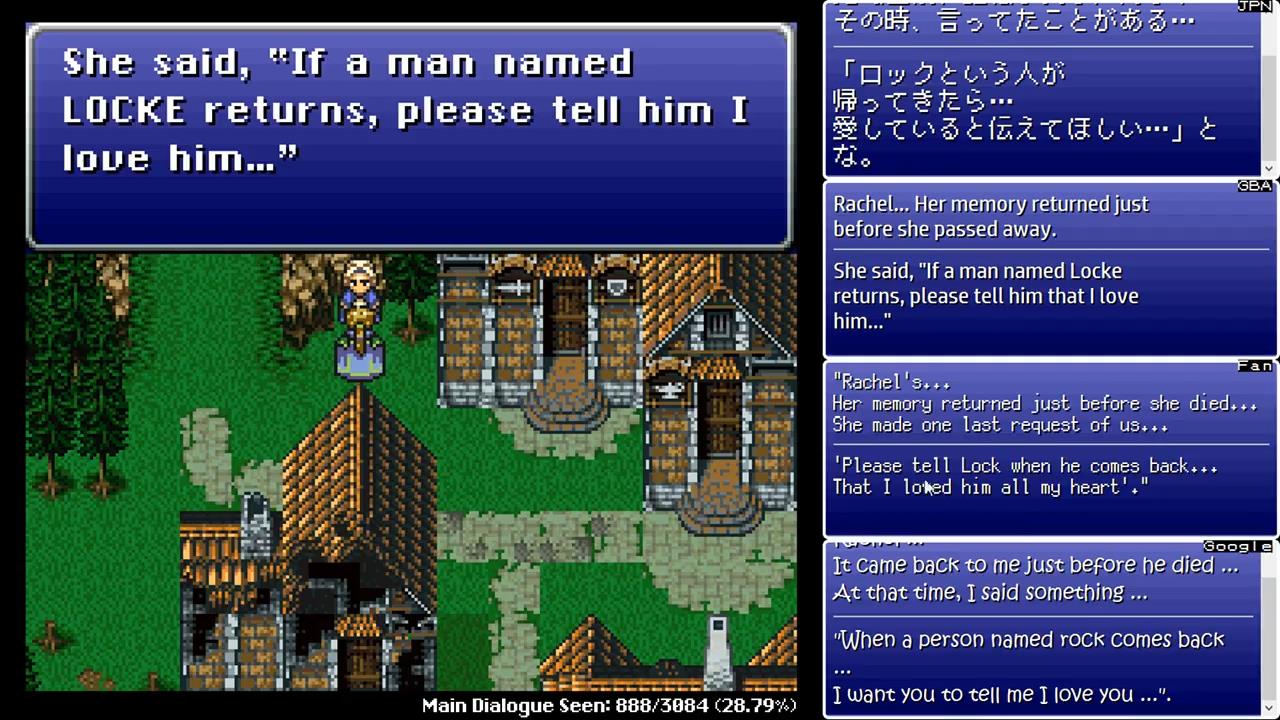
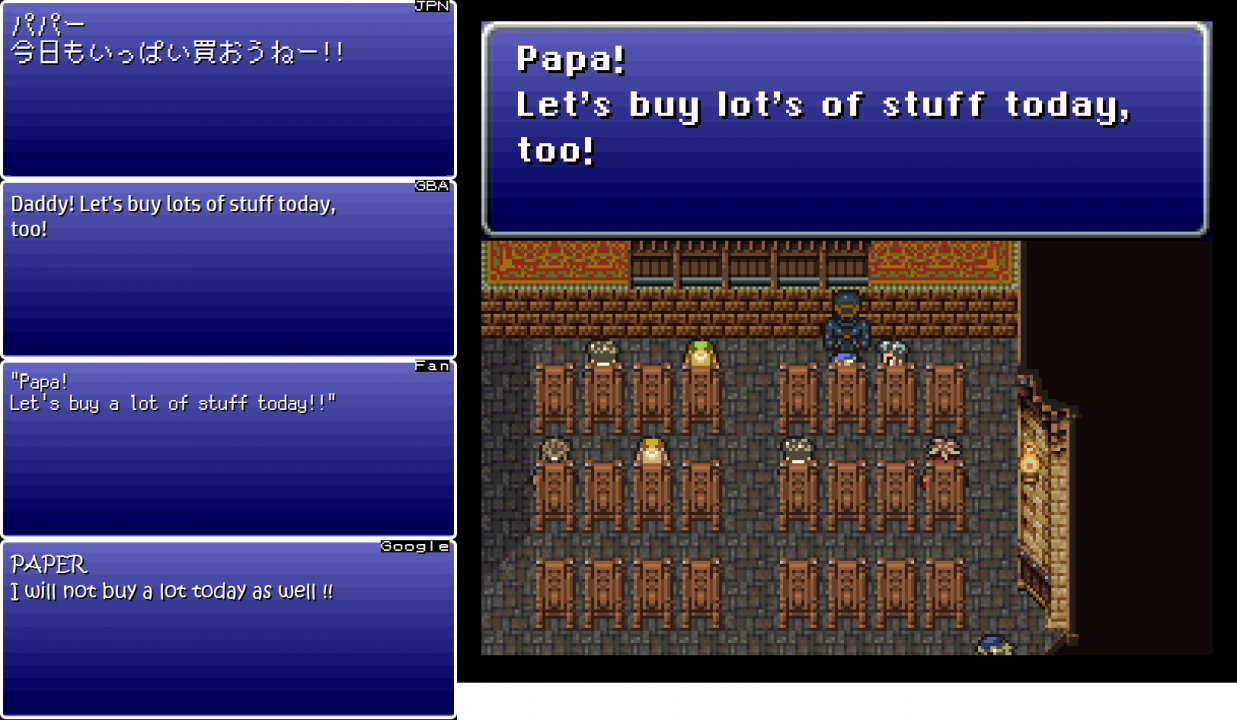
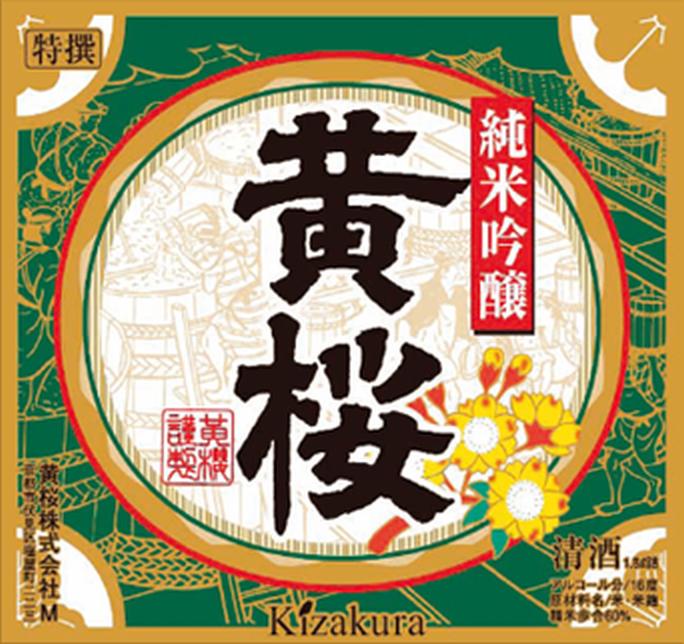
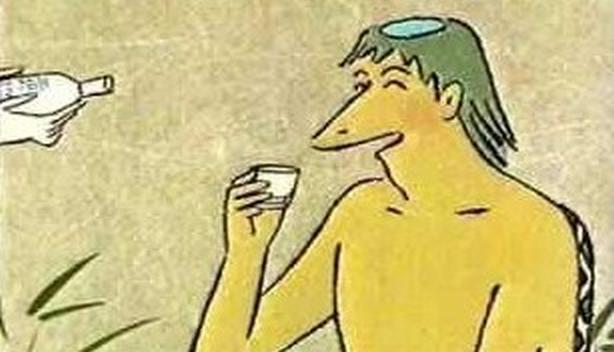
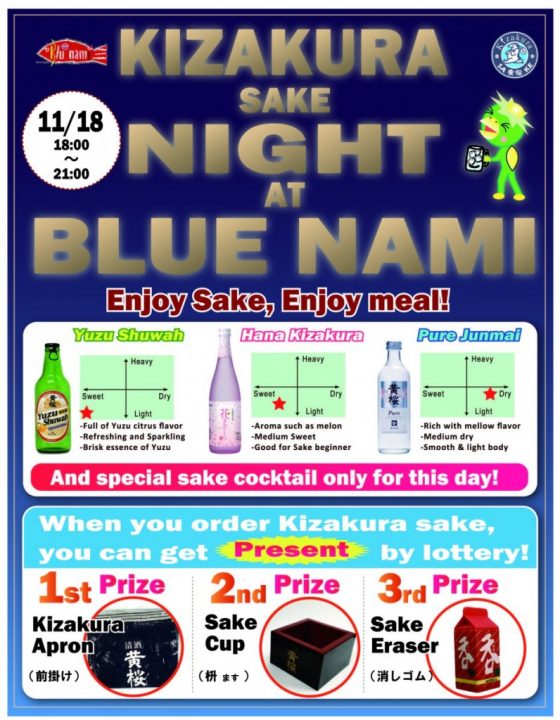
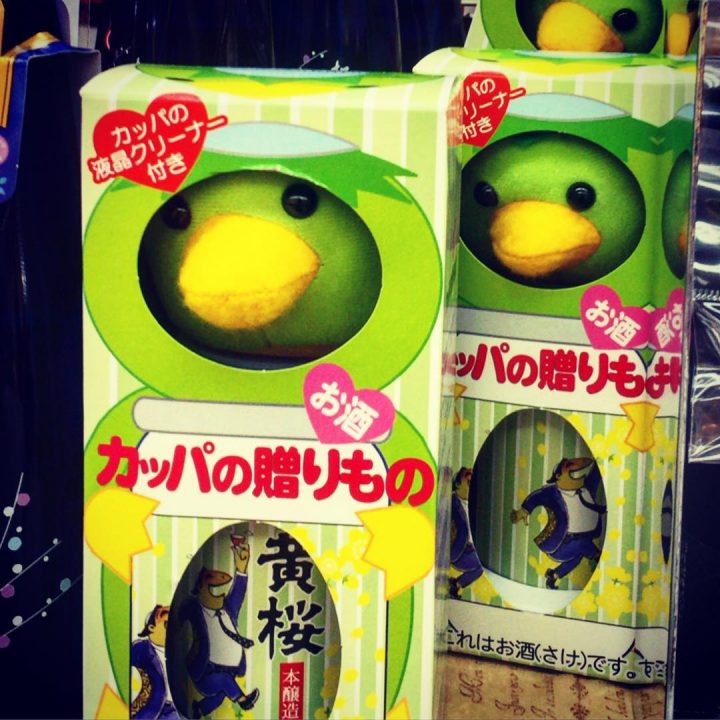
![press start to translate [Final Fantasy IV] press start to translate [Final Fantasy IV]](https://legendsoflocalization.com/wp-content/uploads/2018/05/pressstart.jpg)
Man, the fan translation got dunked on pretty hard this time. I kinda feel bad for the folks who made it.
Sky Render has posted on this site before. I wonder if he’s following this.
I don’t feel too bad for them. If they didn’t want to get criticized, they would have done a better job, after making such a show about how much they hate the work of professionals who were on a time crunch. So yeah, little to no sympathy from me.
Frankly, i’m tired of “fan-translations” that have this pretentious, uppity notion of “The English translators screwed it up so bad WE have to step in as the SUPERIOR ones because we’re smarter and better than stupid old Woosley, we’ll teach him how to do it right ourselves” and then proceed to not know what they’re doing 60% of the time, either. I’ve just been waiting for someone who IS better to knock them down a peg or two.
Why do you put fan translation in quotes? It’s an apt descriptor of what we’re talking about, and it’s not like the term is new or weird.
I quite agree with you, NsX99. It’s amusing when circus performers think they know Japanese better enough to provide a so-called “better translation”, but the only thing they prove is that their translation work has about as much appeal as a moldy sandwich.
Thus, the best fan-translations are for games that have never been officially translated, or ones where the official release was so terrible nearly anything would be an impovement (eg: Breath of Fire 2).
Sky Render was there for at least part of the first stream, so they’re aware of the project.
Yeah, Sky Render’s a cool dude and a pretty regular poster here, and he was also in the chat for the first stream. He’s been really critical of his own work for years and years now and has long disavowed it.
While I definitely pointed out a lot of problems with the fan translation this time, I was actually more surprised and disappointed with the SNES translation this time around. It got some important things completely wrong in ways we hadn’t really seen before from it. I think it might be a case of the earlier content getting extra attention because it’s early in the game, while later content doesn’t get as much attention because it’s so much later. If so, then maybe this is the start of a trend of issues in the SNES version.
“My brother’s a bit…touched.”
This line stuck out to me when I first played the game. I immediately understood that “touched” was short for “touched in the head” and felt it was one of the most “localized” moments I’d experienced up to that point.
I picked up on “wayward spirits” being a hint but incorrectly attributed it into a hint that magicite was for sale.
I was amused by the comments nostalgic about old TV kappa boobs in the second Kizakura video.
Considering his partner’s name is named after infamous outlaw Billy The Kid, I’d imagine Shadow’s real name being Clyde is in reference to another infamous outlaw (Bonnie &) Clyde Barrow.
Oh my god I can’t believe I forgot Bonnie and Clyde, it’s been a thing that’s followed me most of my life and is literally how older people remember my name
My best guess for the cat on fire thing is that’s it’s a reference to Speedy Cat, a popular beatmania song from about the same time as the GBA translation that became meme-y after someone made a flash loop with a literal speedy cat blazing through the night sky all comet-like to the song. It’s a lot like an ancestor of Nyan Cat in a way.
Ah, that would make a lot of sense. It also shows how quickly outdated memes get and how weird they can seem if you’re paying close attention but don’t get a reference.
Personally, I doubt it’s a reference. Sounds more to me like something they just thought would be an apt description. Especially since the reference is so obscure, it’s barely worth making and very doubtful even they knew it.
“Coliseum” just sounds wrong to me.
There’s a word where I keep putting a “T” instead of “C”, but I can’t remember for the life of me what it is.
“Also, this reminds me of another thing: a lot of kids learn new words – and their spellings – from wordy games like JRPGs.”
I specifically remember learning the word “guild” from Pokémon Mystery Dungeon: Explorers.
Also, this isn’t relevant to this specific article, but a pet peeve of mine is when people act like Japanese-to-English is the only kind of translation. I see it a lot on TV Tropes.
The Colosseum was apparently named that way because of a giant staue of Nero built nearby, known as the “Colossus of Nero”.
“Coliseum” is a latter transformation of the word.
We haven’t gotten to it just yet, but this game taught me “lagomorph” as a kid.
Concerning the Philistines comment, it always conjures to mind the Calvin & Hobbes strip about snowmen art. For me, the line drives the point home.
https://yerble.wordpress.com/2011/11/24/philistines-on-the-sidewalk/
Could “cat on fire” be a play on the phrase “bat outta hell”?
Man, every article that’s posted makes me appreciate the GBA translation more and more. I remember a lot of the hardcore fans at the time of its release kept trashing it and going on about how inferior it was to Woolsey’s work. Even at the time I thought they were being unfair, but the context this series provides makes it entirely clear how vastly superior the GBA translation is.
Especially considering the deference granted to the original translation when it makes sense to do so. The GBA translation clearly balanced multiple considerations and seems thoughtfully done.
Incidentally, i’m glad the “fan-translation” is getting it’s just comeuppance. The pretentious and uppity “WE’LL do it BETTER because we’re more smarter than dumb ol’ Woosley” mentality always made me despise the attitude they were even coming at this with in the first place, and hearing that about 60% of it doesn’t know what it’s doing either and is almost as bad as the FF5 translation before it, is quite vindicating to see.
I don’t hear much one way or the other about the quality of RPGe’s FFV’s translation. Most of what I heard was regarding internal drama, though that wasn’t unique to the particular group.
I actually originally intended to do this multi-comparison thing with FFV, so it’ll probably be something I do eventually. I don’t know what to expect from the quality but I mostly hear that it’s “dry”.
If you look online, you’ll see that the main problem people have with the FF6 fan translation is that it’s “too literal”, so I’ve learned not to put much stock in these sorts of claims/reputations.
I look forward to that. 5’s 3 translations are all really distinct from eachother, making it a perfect use for this thing. The GBA version (maybe PS1 or other ports) gives the option of having kanji.
Wait, did you mean FF4? Or has anybode done an in-depth analysis of the FF5 translation? I don’t think I’ve ever heard of it being particularly bad.
I assume he meant FF4. The FF5 fan translation long predated any official translation, and the first official translation was all kinds of terrible on top of that.
Honestly though, it’s a bit late for comeuppance at this point. Sky Render has already learned humility in the time since this translation was released.
I do think it’s good to put this out in the open though, as a warning not to get too spiteful or arrogant, and also as a case study of exactly what kind of mistakes amateurs can make, and how they can legitimately think they’re “fixing errors” while making them.
I’d say that’s more of a negative than anything. The GBA translation is well written and highly accurate 99% of the time, then suddenly it decides it needs to insert some line Woolsey made up out of nowhere. If it was just reusing some particularly clever translation of something that Woolsey had come up with it’d be fine, but for the most part the “original translation” it’s quoting was never a translation in the first place. The end product just ends up having these occasional weird blips of “let’s not translate this particular line and instead just make something up because that’s what Woolsey did” that feels more like it’s trying to fill some quota than anything.
People that wanted their Woolsey lines are already screeching about how “awful” the GBA translation is anyway, some random borrowed lines here and there aren’t going to make them happy.
I prefer the swear censorship done with symbols too! Its technically called “grawlixes” tho its a very niche word.
My first thought was “so if the GBA translation was done 5 years later, would they have tried to reference Nyan Cat instead?” and was immediately glad they didn’t.
Seconding the ‘Billy and Clyde are references to Billy the Kid and Clyde Barrow’ comments (which the FF wiki apparently mentions as well), though I still have no idea why they’d change Billy to Baram in English… It could be a reference to either Clyde’s partner Bonnie or his last name, as the wiki says, though I’d think for the first option something like Bobby would make more sense.
Of course, there’s always the possibility that Nintendo didn’t want such a blatant reference to real-life criminals and asked them to tone it down. In which case, Baram is a pretty nice attempt at keeping it low-key! And honestly, ‘Baram and Clyde’ just sounds… good.
I doubt that Nintendo had qualms with using the names of criminals, the Pokemon anime has team rocket’s Jesse and James, later we also get the duo Cassidy and Butch. Even more egregious is that they always, without fail, announce their names in that order. Because it’s aimed at a younger crowd, I think that theory is reaching quite a bit.
1994 Nintendo and 1999 Nintendo were fairly different beasts as far as what they allowed was concerned.
Oh yeah, it’s definitely kinda out there, I just couldn’t think of many more plausible reasons for the change. (though the comment below comparing it to Tina > Terra is a more reasonable theory that also occurred to me later.)
I wonder how much control Nintendo had over the original Pokemon dub’s naming choices, though.
>I wonder how much control Nintendo had over the original Pokemon dub’s naming choices, though.
Absolutely none, considering that dub had several instances of characters from the game being given random new names because the dubbers didn’t realize they were from the games and already had English names.
The only instances I can think of was Lorelei being renamed Prima because of lip flaps, and the SS Anne keeping its Japanese name of the St. Anne.
“Because of lip flaps”.
Sounds like something along the lines of that “but technically” argument Mato mentions above. No, the dub that had no problem whatsoever changing every single character’s name to the one they had in the English games did not have to make an exception for this particular character “because of lip flaps”. I’m not sure if that was a lie from someone that worked on the show or some cover-up excuse from a fanboy, but it’s very obviously just someone trying to pretend this mistake was totally deliberate and done for unavoidable reasons.
I believe they also used different names for some Magma/Aqua characters from the games, the kimono sisters from Johto, various items and probably a bunch of other things.
Given that not even moral guardians care about criminals who lived over a hundred years ago, I think it’s more likely Woolsey missed the reference and said, “What? Billy? That’s as boring as Tina! I should change it.”.
Hey, Bonnie and Clyde were from the 1930s, that’s not 100 years ago yet!
You’re probably still right, though. 😛
I think it’s possible that Woolsey or another translator didn’t understand what was intended and substituted something else. We saw this with how “Meltdown” became “Merton”. But the “Tina becomes Terra” logic also makes sense.
For a while I’ve wondered what that spell would have become had they realized that was “Meltdown”, as there was still the six character limit to deal with for spell names.
Wow, somehow never noticed that spell names are limited to 6 characters until you mentioned it, although that does explain “Antdot”
Also explains “Cyan” and “Strago”. It’s not just item and spell names, but character names as well.
I wonder if Nuke is family-friendly. Most likely, given it was used in the first game.
And fourth, for the same spell even. Though I wonder why in the case of FFIV since the spell character limit was five in that one, enough to fit “Flare” in. Maybe it was so they could fit the name of Bahamut’s attack into the eight character limit for enemy attacks while staying consistent? But that doesn’t explain how they just cut off part of the spell name for the Twin magic version and left it as “Flare” instead of naming it something like “MiniNuke”.
I know I’m many years late to this particular party, but I’ve wondered if Merton was a corruption of Molten.
>If you have some words you get wrong a lot too, share them in the comments – it’s a phenomenon I rarely get to talk about and would love to learn more!
For me, it’s “commemorate”. I keep misspelling it as “commemmorate” for some reason.
“Parallel” is another, but in that case it’s because the word IS spelled “parallell” in Norwegian, and it occasionally slips my mind that the English spelling is different.
Similar issue for me: recommend. I always want it as “reccommend” at first blush. See also “embarrass” and all of its derivatives, which I want to contain only ONE r rather than two.
I remember a lot of older Viz Shonen Jump manga translations from the early/mid 2000s used the random symbols to censor swearing a lot. Later they would switch to just writing around the swearing and reword things, like referring to hell as “the underworld” or replacing damn with things like “rats”. Now-a-days they have definitely lightened up and will allow minor swearing just fine. I’m currently rereading One Piece (something i do every summer), and with such a long running series like that, it’s easy to see the evolution of how they handled swearing over the course of just that one title.
Billy and Clyde? I feel like the main thing about Bonnie and Clyde is that they were a couple who robbed banks, which adds another dimension to this
> First, a Japanese sake (rice wine) company called “Kizakura” has been around for about 60 years.
By the way, it’s only called “sake” in English. Japan uses “osake” for alcohol in general, but calls this one “nihonshu”.
Just in case someone in the comments wanted to know that.
@Roman fighting place: In general, English speakers have great difficulty spelling words with doubled consonants, since *spoken* English very rarely has geminated consonants, especially within a single morpheme.
@Kappa commercial: Now I want to know why a kappa would fish for another kappa. Is he a cannibal?
Does the Philistines guy change his line if you talk with Relm in the lead (is it even the same by the time she joins)?
I don’t think it did but since she’s 10 he probably assumes she knows nothing about art.
Haha good timing! I was just in a FFVI parody called Final Fantasy 6 In A Nutshell that released yesterday.
Wasn’t part of Shadow’s stop that he chickened out and COULDN’T kill Baram, who begged him to so that he wouldn’t be caught? As I recall, Clyde ran off instead, leaving the wounded Baram at the mercy of the Empire, who were going to torture and execute him (or so he suspected).
No, Shadow’s backstory was heavily mistranslated/censored out in the Woolsey translation, so 99% of any “info” on it you find online in English is going to be wrong.
Somehow that’s much darker than killing him though. It seems odd that they would make it so much worse.
Darker when you think about it in detail, maybe. But “person that’s kicking himself for not having the guts to kill his friend who was begging him to do so, thus ending up subjecting said friend to a lot of pain that could’ve been avoided” is a lot more family friendly than “person that feels bad about once having been such a colossal monster that he murdered his friend in cold blood”, especially when we’re talking about one of the protagonists’ backstory.
…actually never mind my nonsense, I was misremembering the story pretty badly. What you said happened is what happens in the original as well, I just found a clip on Youtube.
“On a side note, I don’t think I’ve ever met any other Clydes in real life – it seems to be a pretty rare name these days”
You may be interested in this.
http://rhiever.github.io/name-age-calculator/index.html?Gender=M&Name=Clyde
Dang, 1920 was when peak Clyde happened. I feel like a lost Clyde in the ocean of time.
Interestingly enough, the drunk Narshe citizen in the GBA script, talked about in the video stream, is a rewritten line taken from the US-prototype script.
Dang, thanks for the tip – I didn’t realize/remember that there was a prototype dump! I updated the article with this new bit of surprising info.
Here’s a reference: https://tcrf.net/Proto:Final_Fantasy_VI
Maybe better to link to the original that tcrf references: https://snescentral.com/article.php?id=0954
Is “Baram” maybe an attempt at the name “Bram?” I remember one of a pair of thieves in Radiant Historia named Bram, which is why that came to mind.
Regarding the famous coin toss scene, I always thought it was an intentionally rigged thing. Like, later on we see Celes cheat Setzer using a two-headed coin (and Edgar references it if he’s in the party), and in the ending we see a coin of Figaro that has both heads on it. I always got the impression that Edgar was using that two-headed coin (maybe newly minted, considering the king had just passed away?) as a way of ensuring Sabin could leave to do what he wanted to.
I know that’s a lot of supposition, but it’s a little disappointing if I actually made it all up and the coin had even odds. I always thought it was a sweet “big bro” thing to do.
I always thought the same thing, that Edgar surreptitiously slipped Celes the same two-headed coin at some point. The hole in this logic is that he would have no opportunity to do so were he not in the party. Having Setzer’s introduction as a notorious gambler in Narshe instead of Jidor would have fixed this, assuming it actually is the same coin.
i coincidentally replayed the game recently and i’m fairly certain what you describe is exactly what happens and how it’s supposed to be interpreted. i believe if both edgar and mash are in the party, mash makes a comment like “…that coin? brother!” the internet also tells me that it has edgar’s face on one side and mash’s on the other, but i don’t recall where or when that’s referenced in-game.
The double-sided coin makes a reappearance at the end of the game! It’s part of the Edgar-Sabin rollcall as they’re retreating from Kefka’s Tower.
This is minor, but I feel like “Papa” works better than “Daddy” coming out of that kid in Jidoor. You could just see a privileged little kid like that saying “Papa”, preferably with emphasis on the second syllable.
I wonder if perhaps you were a bit hard on the SNES translation of the flashback in the Herbalist’s in the Basement. To me, even at the time (I would’ve been 12 or 13, I think), it seemed an obvious inference that Locke had something specific in mind when he asked about the effect of “calling her soul back.” Yeah, the fact that the idea comes from the Herbalist and not Locke himself is garbled, but it still seemed quite clear to me that Locke’s entire treasure hunter career was an attempt to chase down whatever it was he had in mind that day. (And, looking back as an adult, it has just the right combination of desperation and romanticism for him to run off looking for a miracle based on nothing more than a fairy tale he heard as a child, so I can see where this version makes internal sense.)
But on my main point, yeah it’s not strictly accurate and a little less explicit than the original, but I feel like the error isn’t in dropping the information altogether so much as an inappropriate gamble on the audiences ability to infer and extrapolate.
Short of asking him or finding his notes or something I suppose it’s all just speculation anyway.
Oh, and on “rich yokels”: is it possible he was going for “rich suckers”? (Yokel does, to me, imply a certain degree of gullibility; the sort of person who’d fall for the proverbial “buy the Brooklyn Bridge” scam.) The idea being that the bidders in the auction house end up happily overpaying for stuff.
(As for why not just use “suckers” maybe Nintendo of America was feeling particularly prudish that day. Or the preemptive self-censoring went a bit overboard.)
I honestly thought the colosseum/coliseum thing was going to be a simple matter, but it turns out even the wikipedia page for the Roman Colosseum spends paragraph upon paragraph talking about it and the alternate spelling dates back centuries if not millennia.
I heard the “Mind Candy” enemy is a mistranslation of ‘Brain Sucker’